- Applying For Scholarships

How to End a Scholarship Essay
David Dec 3, 2018

Get our best scholarship practices, insights & tips delivered to your inbox
Thank you for subscribing!
You are so close to the end. Your hard work of studying, finding scholarships and applying to them is almost completely behind you. At this point, you may have written most of your scholarship essay.
(If you’re still struggling to start, head over here first ) when you realize, you don’t know how to end a scholarship essay. Well, no fears! We are here with some great tips for writing an awesome conclusion that will help you win the scholarship of your dreams.
How To Write the Conclusion
Your conclusion needs to give the judges the last impression of who you are. It should leave them remembering you.
Your conclusion should do these three things:
The fastest path to earning scholarships
Simplify and focus your application process with the one-stop platform for vetted scholarships.
- Wrap up your story by summing up your main points
- Clarify your thesis in a new and fresh way
- Answer the question: Why is all this important?

This is where you need to answer, why does all this matter to you? What are your hopes for the future? Where do you see yourself in a few years? This is the place to share them. Find a way to connect to your original story that you started your essay with.
A conclusion is a good place for you to explain how the scholarship will help you reach your goals. Share how you plan to use the life lesson from your essay in your future plans, to meet goals or dreams.
Remember, up until now your essay was about your past. The conclusion is your chance to bring the judge back to your present and talk about the future.
For example, if you started your essay by sharing a specific experience… You can conclude the essay by explaining how that experience will impact you in the future.

Scholarship committees have thousands of students to choose from. They want to make sure that the students they choose will get the most out of winning the scholarships.
Ideas On How to End a Scholarship Essay
- End the conclusion with dialogue- this could be words of admiration from a character in the story such as a mentor, parents, or teacher.
- Action- Leave the essay open-ended so that the reader thinks about you. For example, “I put on my jacket and stepped outside confidently.”
- End the conclusion with a description: “The sun began to peak out from the clouds, sending rays of orange and red throughout the sky, warming my face and brightening up the world.”

Finally, don’t forget to revise your paper as well as have family or a teacher also revise it . Revision is necessary to a successful paper. Make sure that you have not left any questions unanswered in your essay. If so, your conclusion is a good place to answer those questions.
Conclusion Example:
Well, I can’t promise that I’m going to find a cure for cancer or the AIDS virus, but, I know one thing is true. The way my eyes would brighten up when we sang that song is the same way they brighten up when I think about my future. While I may not find the cure for fatal illnesses, I know that my passion for the field will defeat any hurdle that stands in my way and that I am going to do everything to be the best doctor that I can be.
- Scholarship Essay

David Tabachnikov is the CEO of ScholarshipOwl. Formerly at Waze and Google, David is an experienced CTO/R&D manager with over 10 years of experience of leading tech teams. David fervently believes that students should have greater access to education, and is passionate about using technology to help them achieve that goal.
Related Stories View All

Get the Latest on Scholarships (And Much More) With This All-Round Amazing Student App

Learn How You Can Apply For More Scholarships

College Baseball Scholarships
Get started with scholarshipowl.
Simplify and focus your application process with the one-stop platform for vetted scholarships
- Skip to primary navigation
- Skip to main content
- Skip to primary sidebar
- Skip to footer

Scholarships in Ink
How to End Your Scholarship Essay
S tarting your scholarship essay with a strong introduction is vital. The strong impact doesn’t stop with the start of your essay, however. You can have a powerful beginning, persuasive content, but completely lose the reader if your conclusion doesn’t leave a lasting impression. Because of this, the end of your scholarship essay is one of the most important pieces of the puzzle.
You want the donor to know you deserve their scholarship more than anyone else submitting an essay. Think of your conclusion as the bow that packages the entire essay to sell yourself as the best candidate.
First, let’s talk about what you should avoid in the closing paragraph.
1. don’t end your essay with “in conclusion.”.
University Language Services explains that this is redundant. By the time your reader reaches the end of the essay, it’s obvious that you’re concluding your thoughts. Instead, use the last part of your scholarship essay to make the final sale. Use the beginning of the conclusion to talk about why you should be chosen for the scholarship.
2. Don’t use your conclusion to just summarize your essay.
Of course, you want to tie all your thoughts together with the pretty bow that I mentioned earlier. Make it spectacular, though. Bring all those thoughts together, and finish with your argument of why you deserve the scholarship. University Language Services notes that you should answer the question of “So what?” in your conclusion. Keep that cue in mind when making it count in the end.
3. Don’t dwell on the important details of your essay.
According to PocketSense , you’ve already talked about the key topics of your essay before you even get to your conclusion. You don’t have to waste valuable word count by repeating yourself. However, you can absolutely highlight the important parts that. Doing so will help the reader understand how those highlights make you an excellent candidate for the scholarship.
Now that we’ve talked about what not to do when writing the end of your scholarship essay, let’s touch on what you should do.
1. talk about the future..
In addition to highlighting the important parts of your past accomplishments in your essay, PocketSense recommends talking about your future plans and goals. The conclusion of your scholarship essay is a great time to let the reader know what your future goals are, and how the scholarship will help you achieve that. This will help tie your past and present together, and show the scholarship judges the value in those thoughts.
2. Tie conclusion back to your introduction.
If you gave a powerful personal story in your introduction, the conclusion is a great time to bring the reader back to that. For example, if you opened your scholarship essay talking about a specific personal story, the conclusion is a great time to tie back to that story and give it a great ending. Essaypro.com explains that this helps gives the reader a more solid connection to you and the story. If your reader has this connection, you’re much more likely to set yourself apart from the other candidates.
3. Use reflection to show personal growth.
Essaypro.com recommends using one of your weaknesses to show your reader how you used a challenge as a stepping stone. Doing so shows personal growth, which is especially appealing for scholarship judges when they are finalizing their decisions on applicants. Most people shy away from discussing their weaknesses and focus only on their strengths. If you’re doing what most people do, you’re missing out on a great opportunity to show even more strengths to your reader!
4. Say thank you to the committee.
The scholarship committee is doing you a great service by potentially awarding you a sum of money towards your education. The conclusion of your scholarship essay is an appropriate time to thank them for considering your application.
5. Edit and revise.
Now that you’ve written your scholarship essay and concluded all your thoughts with the pretty bow on the package, one of the most important parts of the ending is to edit and revise. Be sure to have a parent or teacher (or both!) proofread your entire essay, and offer any advice on edits that need to be made.
You can have a stellar intro, body, and conclusion. You can have a powerful voice through the entire essay, with some great examples of your personal achievements and plans for the future. However, if you fail to have a grammatically sound scholarship essay, you will lose your reader and reduce your influence. All that hard work and valuable thoughts can be diminished.
Take the time to put that final bow on the package, and get ready to hand it off to the scholarship essay committee!
Quick Links
Getting Started Applying for Scholarships Scholarship Essay Tips Sample Scholarship Essays with Feedback
Scholarship FAQs Scholarship Essay Outline Scholarship Planning Worksheets Glossary of Scholarship Terms
Contact Us Our Services Affiliate & Privacy Disclosures
- Search All Scholarships
- Exclusive Scholarships
- Easy Scholarships to Apply For
- No Essay Scholarships
- Scholarships for HS Juniors
- Scholarships for HS Seniors
- Scholarships for College Students
- Scholarships for Grad Students
- Scholarships for Women
- Scholarships for Black Students
- Scholarships
- Student Loans
- College Admissions
- Financial Aid
- Scholarship Winners
- Scholarship Providers
Student-centric advice and objective recommendations
Higher education has never been more confusing or expensive. Our goal is to help you navigate the very big decisions related to higher ed with objective information and expert advice. Each piece of content on the site is original, based on extensive research, and reviewed by multiple editors, including a subject matter expert. This ensures that all of our content is up-to-date, useful, accurate, and thorough.
Our reviews and recommendations are based on extensive research, testing, and feedback. We may receive commission from links on our website, but that doesn’t affect our editors’ opinions. Our marketing partners don’t review, approve or endorse our editorial content. It’s accurate to the best of our knowledge when posted. You can find a complete list of our partners here .
How to Start a Scholarship Essay (With Examples)

Will Geiger is the co-founder of Scholarships360 and has a decade of experience in college admissions and financial aid. He is a former Senior Assistant Director of Admissions at Kenyon College where he personally reviewed 10,000 admissions applications and essays. Will also managed the Kenyon College merit scholarship program and served on the financial aid appeals committee. He has also worked as an Associate Director of College Counseling at a high school in New Haven, Connecticut. Will earned his master’s in education from the University of Pennsylvania and received his undergraduate degree in history from Wake Forest University.
Learn about our editorial policies

Bill Jack has over a decade of experience in college admissions and financial aid. Since 2008, he has worked at Colby College, Wesleyan University, University of Maine at Farmington, and Bates College.

Maria Geiger is Director of Content at Scholarships360. She is a former online educational technology instructor and adjunct writing instructor. In addition to education reform, Maria’s interests include viewpoint diversity, blended/flipped learning, digital communication, and integrating media/web tools into the curriculum to better facilitate student engagement. Maria earned both a B.A. and an M.A. in English Literature from Monmouth University, an M. Ed. in Education from Monmouth University, and a Virtual Online Teaching Certificate (VOLT) from the University of Pennsylvania.

As an admissions officer, I reviewed thousands of essays for students seeking admission and scholarships. The essay is one of the most important parts of the scholarship application process–a strong essay can go a long way. However, with so much competition, it is important for your scholarship essay to stand out. That’s why it’s important for you to start a scholarship essay off right!
There are some very simple things that you can do to ensure that your essay is engaging from the very first sentence. In fact, beginning your essay with an exciting opening is one of the most important things you can do, because it will immediately distinguish your essay from the others.
Keep on reading to learn more about how you can nail the very first sentence and start your essay off right!
Engage the reader with the first sentence
No matter what type of essay you are writing, you will want to ensure that the very first line grabs the attention of the reader. One of the biggest mistakes that students make when starting their essay is simply restating the prompt. This is bland and boring.
Now, you might be wondering, “how do I engage the reader with the very first line of my essay?”. The good news is that there are several ways that you can do this that are very simple to do.
Related: How to answer scholarship essay questions about your career goals
Begin with dialogue
First, you could begin your essay with conversation. This can be an interesting and unexpected way to start your scholarship essay. Maybe someone asked you an unexpected question? Perhaps you were having an interesting conversation with a friend or family member? Either way, dialogue can be a powerful tool to start your essay.
Apply to these scholarships due soon

$10,000 “No Essay” Scholarship

$2,000 Sallie Mae Scholarship

“Mom to Scholar” Scholarship for Mothers

Niche $25,000 “No Essay” Scholarship

“Gutsy Graduate Student” Essay Scholarship

$25k “Be Bold” No-Essay Scholarship

“College Here I Come” Essay Scholarship for High School Seniors

“Making Waves” Scholarship for Women

$10,000 CollegeXpress Scholarship
Put the reader in your shoes.
Alternatively, you can choose to start your essay by placing the reader right in your shoes and show them something from your life. Appeal to the senses and show the reader what you see, hear, smell, or taste. These specific details will help your essay come to life and make it even more memorable.
Also recommended: What’s the best scholarship essay format?
Scholarship essay introduction example
Next, we’ll look at a specific example of how you can open up your essay. Let’s say you are applying for the Questbridge scholarship program . One of the essays that you will be asked is:
We are interested in learning more about you and the context in which you have grown up, formed your aspirations, and accomplished your academic successes. Please describe the factors and challenges that have most influenced you. How are they shaping your future aspirations?
You might be tempted to rephrase the question and start your essay with something like:
“I have grown up in a rural context and this has formed my aspirations and allowed me to accomplish academic success…”
This is generic and will not engage your reader at all.
Instead, what if you started off your essay with something like this:
“I look outside my bedroom window and see Henry, my favorite chicken, pecking at something in the dirt.”
Makes a big difference, right? As a reader, you are probably wondering: why does this person have chickens outside their bedroom window? Why did they name this particular chicken Henry?
See also: Here are our top writing & essay scholarships for students!
Keep the ending of your essay in mind as you write the opening
While crafting your opening, be open to ideas about how to close your essay. There is no need to stress about the ending now, but being mindful of effective ways to end an essay is always a good idea. Say you are opening your scholarship essay with Henry the chicken. Is there a way for Henry to make an impactful appearance at the end of the essay to close things out in a way that perfectly wraps everything up? The key is for the essay ending to be meaningful and memorable for the reader.
Don’t miss: Our free scholarship search tool
If you can’t think of a “wow” scholarship essay beginning, keep writing!
Sometimes, we know what we want to say, point by point, but we are not ready to be creative when it comes to opening an essay. In that case, keep writing! There is always the option of going back and crafting an engaging opening after your essay is written. Simply write your main idea where the first paragraph would be to guide you as you write. After, go back when your creative juices are flowing, and craft the amazing opening (and closing) that your scholarship essay deserves!
Final thoughts
As shown, there are many questions that we as readers will have after reading an engaging essay opening such as the one just shared; We want to learn more about the student who is writing this essay. After all, as a writer trying to stand out in a pile of essays, that is our main goal.
We hope that you have a better understanding of how to start a scholarship essay so you can maximize your chances of winning scholarships!
Additional resources
Scholarships360 is the go-to for all things college admissions and scholarships! Wondering how to write a 250 word essay and how to write a 500 word essay ? Curious how to write an essay about yourself ? Wow, do we have the resources to help! Additionally, check out our free scholarship search tool to help you finance your college education. Best of luck to you and your future endeavors!
Key Takeaways
- The first sentence of the essay is what makes the reader want to continue reading
- Engage the reader by appealing to the senses
- Create a sense of wonder in your essay, making the reader want to learn more about you
- Keep the ending of the essay in mind as you craft the beginning
Frequently asked questions about how to start a scholarship essay
What is an essay hook, how long should my scholarship essay be.

Apply to vetted scholarship programs in one click
Scholarships360 recommended.

Top 64 No Essay Scholarships in April 2024

Top 244 Scholarships for High School Juniors in April 2024

$20k in Exclusive Scholarships from Scholarships360
Trending now.

Top 49 Easy Scholarships✅ to Apply For in April 2024

Top 1,282 Scholarships for High School Seniors in April 2024

Top Scholarships for Current College Students in April 2024
3 reasons to join scholarships360.
- Automatic entry to our $10,000 No-Essay Scholarship
- Personalized matching to thousands of vetted scholarships
- Quick apply for scholarships exclusive to our platform
By the way...Scholarships360 is 100% free!
- Link to facebook
- Link to linkedin
- Link to twitter
- Link to youtube
- Writing Tips
How to Write a Scholarship Essay (With Examples)
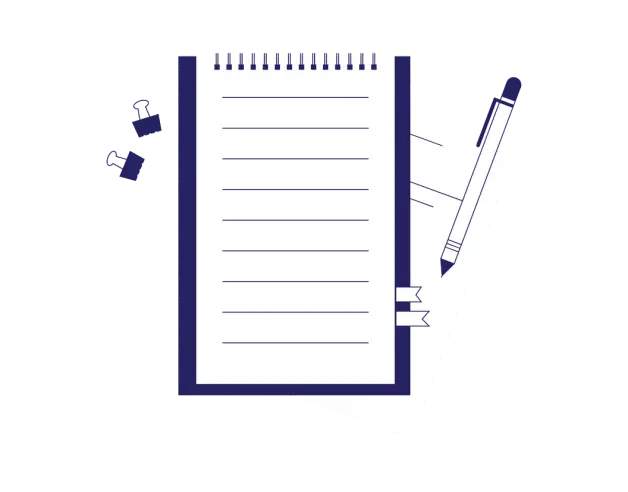
- 6-minute read
- 22nd August 2022
Writing a scholarship essay can seem like a daunting task. For many students , higher education isn’t possible without financial aid, and scholarships are especially valuable because the money awarded doesn’t have to be paid back.
Even though the stakes are high, there are a few manageable steps you can take to ensure you write a great essay to submit with your scholarship applications. We have a few top tips to help you get started, along with writing examples to demonstrate some key points. Check out our guide below to learn more.
A scholarship essay is a great opportunity to present yourself and your accomplishments in an impactful way. It is, therefore, essential to be aware of each scholarship deadline so you can allow sufficient time for the writing process, which typically includes the following:
· Read the essay prompt and brainstorm ideas.
· Create an outline covering the key points you want to address.
· Write a draft and seek feedback from trusted teachers, family, or friends.
· Make any necessary revisions and proofread before submitting your final draft.
Scholarship review committees will be able to tell if you rushed through your essay, so give yourself the best chance of winning an award by staying organized and on schedule!
Who and What?
Researching the scholarship provider and diligently reviewing the essay prompts can help you write an essay that makes you stand out as a top candidate.
1. Who are you writing to?
Learn more about the organization offering the scholarship and why the scholarship fund was created.
For instance, a scholarship may honor its organization’s founder, and the founder’s qualities (e.g., integrity, good citizenship, and leadership) might be the same values guiding the scholarship program as a way to continue the founder’s legacy.
If you identify with any of the same qualities, you can incorporate those keywords into your essay to demonstrate your shared values. Remember to remain authentic, though!
2. What are you writing about?
You must read the essay prompt carefully to identify precisely what you need to accomplish with your essay.
Some prompts ask about your career goals and how you plan to achieve them or your achievements and the challenges you overcame to reach them.
You’ll write about common topics across multiple scholarship applications – some may even be similar to your college admission essay – so you can repurpose your essays as long as you’re diligent about tailoring each one to its prompt.
Your application will likely require other items such as transcripts and test scores, but the essay is your chance to offer something entirely unique. Write about key experiences that highlight who you are and what you’ve accomplished, or you could mention something you’re passionate about.
Remember to follow any specific instructions regarding length and formatting, and be sure to answer all questions listed in the prompt. It can hurt your chances if you’re unable to show the committee that you’re detail-oriented and can follow directions.
Structuring Your Essay
Your essay should follow a standard format that includes a clear beginning, middle, and end. Typically, you should:
· Establish your main idea in the introduction.
· Include a separate body paragraph for each key point that supports your main idea.
· Draw it all together and revisit your main idea in the conclusion.
Scholarship committees read thousands of essays each year. And often, there are hundreds of applicants for an award that can only go to a select few candidates. Writing a powerful introduction and conclusion gives you a chance to make a lasting impression.
1. Introduction
Write an introduction that hooks the reader and encourages them to stay engaged till the end of your essay. Don’t be afraid to add personal, tangible details and an anecdote .
Find this useful?
Subscribe to our newsletter and get writing tips from our editors straight to your inbox.
For example, if you’re writing about your career goals, demonstrate why you’ve chosen that career:
It was the biggest game of the season, and the stands were packed despite the bitter cold. My heart was beating louder than all of the cheers, and I was filled with the anticipation that one more run into the end zone would give us the championship. Everything went silent during that run when the tackle shattered both my leg and my dreams.
My world has always revolved around being an athlete – until one day it couldn’t. I spent many frustrating months rehabilitating, but I got through it because of my dedicated physical therapist, who helped me recover both physically and mentally after a devastating loss. And it was that profound experience that led me to pursue a career in the exercise sciences.
2. Conclusion
The conclusion is the last thing your reader will see, so it’s another opportunity for you to make your essay memorable.
Rather than summarizing with a general statement such as “this is why you should award me a scholarship,” perhaps explain what the financial assistance will help you achieve:
My parents never had the opportunity to go to college, and neither did their parents. I watched them work hard every day just to make ends meet, and I often questioned whether I could achieve anything more. Nevertheless, I spent four years working as hard as I saw my parents work, and I beat the odds by getting accepted to college. A scholarship could be invaluable for me, as it would allow me to attend and be successful without having to worry about finances.
Persuasive Writing
While you don’t want your scholarship essay to be overly informal, you’re certainly allowed to add some creativity and personal details to help persuade your readers.
One of the best ways to do so is by writing with the modes of persuasion ; that is, ethos, pathos, and logos.
Demonstrate your credibility. Use your real-life experiences and interesting details to establish, for example, how you’ve contributed to your community:
I saw how much bullying was impacting so many students at my school, so I founded my high school’s first anti-bullying club and organized campaigns to bring attention to the harm that people can cause one another.
Evoke an emotional response. The “show, don’t tell ” writing technique, which involves using descriptive words when discussing actions and emotions, can be especially useful here:
During one of our first awareness assemblies, the theater was completely silent as I read aloud anonymous stories from students about the scars bullying had left on their lives. Tears were stinging in my eyes as I described the struggles my classmates were facing, but I persevered to give a voice to those who didn’t have one.
Convey your point with reason and facts. Use statistics to demonstrate what you’ve accomplished:
In the first year alone, our club improved students’ feelings of safety and acceptance at our school by 53%.
Proofreading and Editing
Don’t forget the importance of proofreading your essay, as spelling and grammar mistakes can leave a bad impression on your reader. Our expert editors can help ensure your writing is clear, concise, and error-free. Give yourself a better chance at impressing scholarship committees by submitting a free trial document today!
Share this article:
Post A New Comment
Got content that needs a quick turnaround? Let us polish your work. Explore our editorial business services.
3-minute read
What Is a Content Editor?
Are you interested in learning more about the role of a content editor and the...
4-minute read
The Benefits of Using an Online Proofreading Service
Proofreading is important to ensure your writing is clear and concise for your readers. Whether...
2-minute read
6 Online AI Presentation Maker Tools
Creating presentations can be time-consuming and frustrating. Trying to construct a visually appealing and informative...
What Is Market Research?
No matter your industry, conducting market research helps you keep up to date with shifting...
8 Press Release Distribution Services for Your Business
In a world where you need to stand out, press releases are key to being...
How to Get a Patent
In the United States, the US Patent and Trademarks Office issues patents. In the United...

Make sure your writing is the best it can be with our expert English proofreading and editing.
How to Write a Scholarship Essay (with Examples)
September 27, 2023

While applying to college, many students are faced with an additional, daunting task: how to write a scholarship essay. Financial need, already a sensitive subject, can become a stressful factor in the process alongside other existential unknowns. Luckily, scholarship essays will not require you to go tiptoeing around the taboo topic of money. Furthermore, most scholarship essay prompts more or less resemble standard supplemental essay questions. The trick then is to make your scholarship essay stand out. The following article and scholarship essay example will offer up pointers for anyone striving to win a college scholarship.
Organizing Scholarship Essays by Prompt
You may feel like melting into a lump of despair when facing a browser full of tabbed scholarships. The best way to avoid getting overwhelmed is to organize and analyze a list of prompts. Why? Because your first goal is not simply to figure out how to write a scholarship essay. Rather, you’ll want to know how to save time while writing complex and relevant scholarship essays.
As you look over the various prompts, you’ll notice that some sound fairly open-ended, while others ask for something quite specific. In response, you should annotate each prompt with thematic keywords. This will help you figure out when you can use the same essay for several prompts.
Your annotated list may look something like the following…
Sample Scholarship Essay Prompts
1) “Explain something that made a big impact in your life.”
- Keywords: event , personal development, growth, background
2) “We’re committed to diversifying education abroad by providing funding to students who are typically under-represented in study abroad. Please describe how you and/or your plans for study abroad could be viewed as under-represented.”
- Keywords: minority, diversity, identity, study abroad
3) “Some students have a background, identity, interest, or talent that is so meaningful they believe their application would be incomplete without it. If this sounds like you, then please share your story.”
- Keywords: background, identity, interest, talent
Sample Scholarship Essay Prompts, Continued
4) “Please explain a personal hardship or catastrophic life event that you have experienced. How did you manage to overcome this obstacle? What did you learn and how did you grow from it?”
- Keywords: event, personal development, growth, challenge, background
5) Describe a change you would like to make in the world. Tell us about how you would plan to make that change, and what obstacles you might encounter along the way.
- Keywords: world development, challenge, future
6) “Tell us three things that are important to you. How did you arrive at this list? Will these things be important to you in ten years? Why?”
- Keywords: background, values, interest, development, identity, future
Scholarship Essay Prompts ( Continued)
7) “What does it mean to you to be part of a minority community? What challenges has it brought and how have you overcome them? What are the benefits?”
- Keywords: minority, community, challenge, growth
8) “Please explain how your experience volunteering and participating in community service has shaped your perspective on humanity. Elaborate on how these experiences have influenced your future ambitions and career choice.”
- Keywords: community service, humanity, community, background, future, values, career
9) “Discuss in your essay any challenges or obstacles you have dealt with and overcome in life and how this will help you succeed in college and beyond. Describe how volunteer, community service or extra-curricular activities have shaped who you are today and what it has taught you. May also include future educational plans and career goals.”
- Keywords: challenge, future, community service, interests, value, personal growth, career
How to Write a Scholarship Essay through Prompt Analysis
Let’s compare some prompts by keywords. You’ll notice that some prompts have a lot of overlap, such as prompts 1 and 4. Both have event, personal development, growth, and background as keywords . Prompt 4 includes the additional keyword challenge . This prompt explicitly asks you to explain how you have “overcome” a “personal hardship or catastrophic life event.” While prompt 1 is not so specific, it would be easy, even natural, to include this narrative arc in your response. This means depicting how you faced the thing that “made a big impact in your life.” In other words, these two essay prompts, though worded differently, allow you to tell the same story.
Other prompts provide potential overlap. In this case, it’s up to you to find and interpret these moments. You may consider the values, strengths, interests, and experiences you wish to relate. For example, prompts 7, 8, and 9 all mention community through different approaches. While prompt 7 focuses on one’s past involvement in a minority community, prompts 8 and 9 are more future-facing, and don’t mention minorities.
Scholarship Essay Examples (Continued)
Here, your best strategy involves answering prompts 8 and 9 together in a single scholarship essay. To do so, the essay would need to detail “a challenge or obstacle you have dealt with” (9) which has thus “shaped your perspective on humanity” (8). This narrative arc will thus inform your “future” educational and career plans (8 and 9). Note that prompt 9 allows you to mention extra-curriculars. However, I wouldn’t recommend it, since this would make your essay less relevant to prompt 8. After your essay is written, adapt it to align with prompt 7. Consider condensing the part about the future into one final sentence and focusing more on minority aspects of your community.
How to Scholarship Essay Avoid Burnout
The above tactic will allow you to avoid burnout by strategizing your essay approach ahead of time. In turn, you’ll be able to maximize your efforts from the get-go. You’ll also likely find that your essays become more complex and nuanced when you consider several prompts at once.
The next step involves editing. Refer back to the prompt, once you have a draft written. Ask yourself, did I answer the question fully? Do I need to edit this essay further to emphasize a particular point? Do I need to cut the essay down to fit a new word count? Contrarily do I need to bulk it up? If so, are there other essays in my portfolio from which I can borrow material? Strategic editing will allow you to respond to a large number of essays during peak essay-writing season.
Finally, you’ll notice that most essays require a word count between 250 to 600 words. It’s often easier to write a longer essay first. This will allow you to go into greater detail without censoring your ideas. You may find yourself including dialogue, scenery, emotions, and all sorts of other specifics that make an essay personal. As you whittle down this essay to comply with a similar prompt, you’ll want to identify which pieces of the essay do the most work to get your message across. Don’t simply condense everything by eliminating details, for details are often the most memorable aspects of an essay. More on this next.
How to Write a Scholarship Essay Using the Three Fs
The three Fs can be applied to any college essay, though they are particularily useful in scholarship essays. Why? Because the three Fs will enable you to impress readers and beat out other applicants. Ultimately, they’ll help you win financial support. Think of the three Fs as a checklist to go over, once you’ve completed an essay draft. Ask yourself, is my essay fabulous? Flawless? Fearless?
How to Write a Scholarship Essay (Continued)
If your essay is fabulous , it glitters with personality. It is detailed, unique, and does its best to highlight your impressive journey. If your essay lacks a little fab, ask yourself, how can I make this essay more enjoyable and memorable to read? If your essay is flawless , it lacks all spelling, syntactic and grammatical errors. It answers every aspect of the essay prompt, and leaves no room for vagueness or misunderstandings. To avoid flaws, give your essay to several people to proofread. Finally, if your essay is fearless , it is not afraid to get a little vulnerable. This may sound contradictory to the first F. On the contrary, this fearlessness refers to the confidence to tell your own story. A fearless story isn’t afraid to go deep, add complexity, or get emotional. It is unafraid to show why its author deserves a financial boost.
Scholarship Essay Example
Now that we’ve established how to approach the scholarship essay, let’s dive into a scholarship essay example. The scholarship essay below stems from a prompt we saw above: Describe a change you would like to make in the world. Tell us about how you would plan to make that change, and what obstacles you might encounter along the way (500 words).
My generation is growing up in a time of increased global turmoil. We’ve witnessed Brexit, the Russian interference in the 2016 U.S. elections, a series of refugee crises, and the invasion of Ukraine. It’s easy to liken this moment to Europe in the 1930s, which saw a spike in fascism and propaganda (their version of fake news). Only now, my generation must also contend with the hottest summers on record, raging forest fires, and the beginning of the 6 th extinction. It’s no wonder we deal with it all through increased skepticism and existential dread.
While I don’t have a simple solution, I believe most problems stem from ignorance. Xenophobia and racism, offshoots of ignorance, can be overcome by exposing isolated groups of people to greater diversity. This begins in the classroom. While dictators are hard to dispose of, education provides critical thinking skills, which allow citizens to make informed decisions when electing officials. Finally, developing a willingness to learn at an early age creates an instinct to continue learning throughout life. We desperately need intellectual flexibility if we are going to adapt to the planet’s needs as a world population and put a stop to industry-led fossil fuel burning.
Scholarship Essay Example (Continued)
The change I’d like to make is free, enhanced education for everyone, at every level, from elementary school to post-doctorate research institutes. To do so, I suggest defunding national militaries and channeling this spending into schools. Imagine if 80% of the 877 billion dollars the U.S. military spends annually went into learning. Combating fascism and climate change would look more feasible. And yet, no leader would agree to making their country more vulnerable by relinquishing arms and armies. Change must come from the people.
As the planet continues to heats up, and conflict over land increases, we must work together. The first step towards increased education is communicating this need for education: through journalism, on social media, in the streets. Next, I suggest lobbying politicians for incremental change. Finally, I believe a global grassroots movement to implement future-focused education, led by activists, educators, and philanthropists, would make this theoretical idea a tangible reality.
Last year, my mother, who never received a college education, decided to offer free gardening courses in our backyard. I quickly joined in. While teaching a handful of neighbors how to provide year-round food for pollinators may seem trivial, I’ve already seen positive repercussions. One conservative neighbor has set up an organization that collects and redistributes leftover produce from the markets to refugees. Another neighbor is now teaching middle schoolers how to cook and compost. These efforts have brought unusual strangers together and given visibility to our movement, #futurefocusededucation. I’ve seen it firsthand. The more we educate, the sooner we can combine our knowledge to create solutions.
Scholarship Essay Example Dissected
This scholarship essay succeeds at answering all parts of the prompt. It includes the change the author wants to make, and inevitable obstacles she’d face at the governmental and international level. These obstacles may sound insurmountable. Yet the essay shows that individuals are not powerless to enact change when they work together towards a common goal. The author provides various thoughtful steps we might take in order to prioritize education and peaceful collaboration.
Finally, the author portrays herself as someone personally invested in the political, humanitarian, and environmental state of the world. She proves that she’s already begun to make the changes she wants to see at the microscopic level. Overall, readers of this scholarship essay can see that this student is invested in bettering the world. This student would make for a proactive participant in her academic environment.
What’s Next?
Now that you have some inkling of how to write a scholarship essay and have reviewed of our scholarship essay examples, you may want to delve into more aid-related articles on the College Transitions Dataverse. You can read up on Need-Based Financial Aid Grants , and learn about Selective Colleges with Generous Scholarships . Furthermore, you may want to create your own Scholarship Timeline , in order to stay on top of the various deadlines. Good luck!
- Costs & Financial Aid

Kaylen Baker
With a BA in Literary Studies from Middlebury College, an MFA in Fiction from Columbia University, and a Master’s in Translation from Université Paris 8 Vincennes-Saint-Denis, Kaylen has been working with students on their writing for over five years. Previously, Kaylen taught a fiction course for high school students as part of Columbia Artists/Teachers, and served as an English Language Assistant for the French National Department of Education. Kaylen is an experienced writer/translator whose work has been featured in Los Angeles Review, Hybrid, San Francisco Bay Guardian, France Today, and Honolulu Weekly, among others.
- 2-Year Colleges
- Application Strategies
- Best Colleges by Major
- Best Colleges by State
- Big Picture
- Career & Personality Assessment
- College Essay
- College Search/Knowledge
- College Success
- Dental School Admissions
- Extracurricular Activities
- Graduate School Admissions
- High School Success
- High Schools
- Law School Admissions
- Medical School Admissions
- Navigating the Admissions Process
- Online Learning
- Private High School Spotlight
- Summer Program Spotlight
- Summer Programs
- Test Prep Provider Spotlight

“Innovative and invaluable…use this book as your college lifeline.”
— Lynn O'Shaughnessy
Nationally Recognized College Expert
College Planning in Your Inbox
Join our information-packed monthly newsletter.
I am a... Student Student Parent Counselor Educator Other First Name Last Name Email Address Zip Code Area of Interest Business Computer Science Engineering Fine/Performing Arts Humanities Mathematics STEM Pre-Med Psychology Social Studies/Sciences Submit
US South Carolina
Recently viewed courses
Recently viewed.
Find Your Dream School
This site uses various technologies, as described in our Privacy Policy, for personalization, measuring website use/performance, and targeted advertising, which may include storing and sharing information about your site visit with third parties. By continuing to use this website you consent to our Privacy Policy and Terms of Use .
COVID-19 Update: To help students through this crisis, The Princeton Review will continue our "Enroll with Confidence" refund policies. For full details, please click here.
Enter your email to unlock an extra $25 off an SAT or ACT program!
By submitting my email address. i certify that i am 13 years of age or older, agree to recieve marketing email messages from the princeton review, and agree to terms of use., writing a winning college scholarship essay.
If you need more money to pay for college, chances are you will be applying for several college scholarships . A great scholarship essay helps the scholarship provider understand the real person behind the application and can be the key to winning the award (assuming you meet the other scholarship criteria).

Scholarship Essays vs. College Essays
Scholarship essays are very similar to your college application essays in terms of strategy. Many scholarship hopefuls will share the same grades, test scores, and ambitions: the essay is your chance to shine (and grow that dream college fund!).
How to Write a Scholarship Essay
When you’re drafting your scholarship essay, here are some helpful tips to keep in mind:
1. Start the essay writing process early.
Leave yourself plenty of time to produce a well thought-out entry. Take the time to brainstorm your ideas, create an outline, and edit your entry as you would for any essay writing assignment for your English class.
Read More: How to Craft an Unforgettable College Essay
2. Understand the scholarship provider’s overall mission and purpose.
Each scholarship provider is looking for students who meet certain criteria. Consider writing about an experience or interest that highlights your strong ties to the organization’s mission. Genuine passion and enthusiasm for your topic will show through in your essay writing.
3. Follow the scholarship essay instructions.
Make sure to follow all of the necessary steps and review them before submitting your scholarship essay. Trust us, some of the brightest students have missed out on the chance to earn scholarships dollars all because they neglected to follow instructions. You don’t want to fall into that category!
4. Steer clear from essay topics that focus on negativity or pessimism.
Scholarship committees would rather see how you overcame hardships and succeeded despite the obstacles in your path (or what you learned from the times you failed).
Read More: 200 Colleges That Pay You Back
5. Don’t be afraid to get personal.
Share something about who you are. This is your chance to elaborate on elsewhere on your application you wouldn’t have had the opportunity to do so. Telling your story makes an essay genuine and ultimately more memorable to the scholarship committee.
6. Seek out writing advice and feedback.
Asking teachers, counselors, family members, or trustworthy friends for feedback on your essay will result in a better final product.
7. Yes, spelling and grammar matter.
Scholarship committees do notice grammar mistakes . Eveny tiny errors can distract a reader from your overall message. Before you submit your application make sure you take the time to proofread your essay from beginning to end.
8. Don’t give up!
When you’re tired, take a break, but don’t throw in the towel! Our online essay writing tutors are here for you anytime you get discouraged. We can help with everything from brainstorming and outlining to revising the final draft.
Looking for strategic college advice?
Get one-on-one help from former Ivy League and top tier admission officers. Our College Admission Counselors will help you find, apply, and get accepted to your dream school.

Explore Colleges For You
Connect with our featured colleges to find schools that both match your interests and are looking for students like you.

Career Quiz
Take our short quiz to learn which is the right career for you.

Get Started on Athletic Scholarships & Recruiting!
Join athletes who were discovered, recruited & often received scholarships after connecting with NCSA's 42,000 strong network of coaches.

Best 389 Colleges
165,000 students rate everything from their professors to their campus social scene.
SAT Prep Courses
1400+ course, act prep courses, free sat practice test & events, 1-800-2review, free digital sat prep try our self-paced plus program - for free, get a 14 day trial.

Free MCAT Practice Test
Thank you! Look for the MCAT Review Guide in your inbox.
I already know my score.

Enrollment Advisor
1-800-2REVIEW (800-273-8439) ext. 1
1-877-LEARN-30
Mon-Fri 9AM-10PM ET
Sat-Sun 9AM-8PM ET
Student Support
1-800-2REVIEW (800-273-8439) ext. 2
Mon-Fri 9AM-9PM ET
Sat-Sun 8:30AM-5PM ET
Partnerships
- Teach or Tutor for Us
College Readiness
International
Advertising
Affiliate/Other
- Enrollment Terms & Conditions
- Accessibility
- Cigna Medical Transparency in Coverage
Register Book
Local Offices: Mon-Fri 9AM-6PM
- SAT Subject Tests
Academic Subjects
- Social Studies
Find the Right College
- College Rankings
- College Advice
- Applying to College
- Financial Aid
School & District Partnerships
- Professional Development
- Advice Articles
- Private Tutoring
- Mobile Apps
- Local Offices
- International Offices
- Work for Us
- Affiliate Program
- Partner with Us
- Advertise with Us
- International Partnerships
- Our Guarantees
- Accessibility – Canada
Privacy Policy | CA Privacy Notice | Do Not Sell or Share My Personal Information | Your Opt-Out Rights | Terms of Use | Site Map
©2024 TPR Education IP Holdings, LLC. All Rights Reserved. The Princeton Review is not affiliated with Princeton University
TPR Education, LLC (doing business as “The Princeton Review”) is controlled by Primavera Holdings Limited, a firm owned by Chinese nationals with a principal place of business in Hong Kong, China.
Have a language expert improve your writing
Run a free plagiarism check in 10 minutes, generate accurate citations for free.
- Knowledge Base
- How to conclude an essay | Interactive example
How to Conclude an Essay | Interactive Example
Published on January 24, 2019 by Shona McCombes . Revised on July 23, 2023.
The conclusion is the final paragraph of your essay . A strong conclusion aims to:
- Tie together the essay’s main points
- Show why your argument matters
- Leave the reader with a strong impression
Your conclusion should give a sense of closure and completion to your argument, but also show what new questions or possibilities it has opened up.
This conclusion is taken from our annotated essay example , which discusses the history of the Braille system. Hover over each part to see why it’s effective.
Braille paved the way for dramatic cultural changes in the way blind people were treated and the opportunities available to them. Louis Braille’s innovation was to reimagine existing reading systems from a blind perspective, and the success of this invention required sighted teachers to adapt to their students’ reality instead of the other way around. In this sense, Braille helped drive broader social changes in the status of blindness. New accessibility tools provide practical advantages to those who need them, but they can also change the perspectives and attitudes of those who do not.

Instantly correct all language mistakes in your text
Upload your document to correct all your mistakes in minutes

Table of contents
Step 1: return to your thesis, step 2: review your main points, step 3: show why it matters, what shouldn’t go in the conclusion, more examples of essay conclusions, other interesting articles, frequently asked questions about writing an essay conclusion.
To begin your conclusion, signal that the essay is coming to an end by returning to your overall argument.
Don’t just repeat your thesis statement —instead, try to rephrase your argument in a way that shows how it has been developed since the introduction.
Receive feedback on language, structure, and formatting
Professional editors proofread and edit your paper by focusing on:
- Academic style
- Vague sentences
- Style consistency
See an example

Next, remind the reader of the main points that you used to support your argument.
Avoid simply summarizing each paragraph or repeating each point in order; try to bring your points together in a way that makes the connections between them clear. The conclusion is your final chance to show how all the paragraphs of your essay add up to a coherent whole.
To wrap up your conclusion, zoom out to a broader view of the topic and consider the implications of your argument. For example:
- Does it contribute a new understanding of your topic?
- Does it raise new questions for future study?
- Does it lead to practical suggestions or predictions?
- Can it be applied to different contexts?
- Can it be connected to a broader debate or theme?
Whatever your essay is about, the conclusion should aim to emphasize the significance of your argument, whether that’s within your academic subject or in the wider world.
Try to end with a strong, decisive sentence, leaving the reader with a lingering sense of interest in your topic.
The easiest way to improve your conclusion is to eliminate these common mistakes.
Don’t include new evidence
Any evidence or analysis that is essential to supporting your thesis statement should appear in the main body of the essay.
The conclusion might include minor pieces of new information—for example, a sentence or two discussing broader implications, or a quotation that nicely summarizes your central point. But it shouldn’t introduce any major new sources or ideas that need further explanation to understand.
Don’t use “concluding phrases”
Avoid using obvious stock phrases to tell the reader what you’re doing:
- “In conclusion…”
- “To sum up…”
These phrases aren’t forbidden, but they can make your writing sound weak. By returning to your main argument, it will quickly become clear that you are concluding the essay—you shouldn’t have to spell it out.
Don’t undermine your argument
Avoid using apologetic phrases that sound uncertain or confused:
- “This is just one approach among many.”
- “There are good arguments on both sides of this issue.”
- “There is no clear answer to this problem.”
Even if your essay has explored different points of view, your own position should be clear. There may be many possible approaches to the topic, but you want to leave the reader convinced that yours is the best one!
Here's why students love Scribbr's proofreading services
Discover proofreading & editing
- Argumentative
- Literary analysis
This conclusion is taken from an argumentative essay about the internet’s impact on education. It acknowledges the opposing arguments while taking a clear, decisive position.
The internet has had a major positive impact on the world of education; occasional pitfalls aside, its value is evident in numerous applications. The future of teaching lies in the possibilities the internet opens up for communication, research, and interactivity. As the popularity of distance learning shows, students value the flexibility and accessibility offered by digital education, and educators should fully embrace these advantages. The internet’s dangers, real and imaginary, have been documented exhaustively by skeptics, but the internet is here to stay; it is time to focus seriously on its potential for good.
This conclusion is taken from a short expository essay that explains the invention of the printing press and its effects on European society. It focuses on giving a clear, concise overview of what was covered in the essay.
The invention of the printing press was important not only in terms of its immediate cultural and economic effects, but also in terms of its major impact on politics and religion across Europe. In the century following the invention of the printing press, the relatively stationary intellectual atmosphere of the Middle Ages gave way to the social upheavals of the Reformation and the Renaissance. A single technological innovation had contributed to the total reshaping of the continent.
This conclusion is taken from a literary analysis essay about Mary Shelley’s Frankenstein . It summarizes what the essay’s analysis achieved and emphasizes its originality.
By tracing the depiction of Frankenstein through the novel’s three volumes, I have demonstrated how the narrative structure shifts our perception of the character. While the Frankenstein of the first volume is depicted as having innocent intentions, the second and third volumes—first in the creature’s accusatory voice, and then in his own voice—increasingly undermine him, causing him to appear alternately ridiculous and vindictive. Far from the one-dimensional villain he is often taken to be, the character of Frankenstein is compelling because of the dynamic narrative frame in which he is placed. In this frame, Frankenstein’s narrative self-presentation responds to the images of him we see from others’ perspectives. This conclusion sheds new light on the novel, foregrounding Shelley’s unique layering of narrative perspectives and its importance for the depiction of character.
If you want to know more about AI tools , college essays , or fallacies make sure to check out some of our other articles with explanations and examples or go directly to our tools!
- Ad hominem fallacy
- Post hoc fallacy
- Appeal to authority fallacy
- False cause fallacy
- Sunk cost fallacy
College essays
- Choosing Essay Topic
- Write a College Essay
- Write a Diversity Essay
- College Essay Format & Structure
- Comparing and Contrasting in an Essay
(AI) Tools
- Grammar Checker
- Paraphrasing Tool
- Text Summarizer
- AI Detector
- Plagiarism Checker
- Citation Generator
Your essay’s conclusion should contain:
- A rephrased version of your overall thesis
- A brief review of the key points you made in the main body
- An indication of why your argument matters
The conclusion may also reflect on the broader implications of your argument, showing how your ideas could applied to other contexts or debates.
For a stronger conclusion paragraph, avoid including:
- Important evidence or analysis that wasn’t mentioned in the main body
- Generic concluding phrases (e.g. “In conclusion…”)
- Weak statements that undermine your argument (e.g. “There are good points on both sides of this issue.”)
Your conclusion should leave the reader with a strong, decisive impression of your work.
The conclusion paragraph of an essay is usually shorter than the introduction . As a rule, it shouldn’t take up more than 10–15% of the text.
Cite this Scribbr article
If you want to cite this source, you can copy and paste the citation or click the “Cite this Scribbr article” button to automatically add the citation to our free Citation Generator.
McCombes, S. (2023, July 23). How to Conclude an Essay | Interactive Example. Scribbr. Retrieved April 11, 2024, from https://www.scribbr.com/academic-essay/conclusion/
Is this article helpful?
Shona McCombes
Other students also liked, how to write an essay introduction | 4 steps & examples, how to write a thesis statement | 4 steps & examples, example of a great essay | explanations, tips & tricks, unlimited academic ai-proofreading.
✔ Document error-free in 5minutes ✔ Unlimited document corrections ✔ Specialized in correcting academic texts
What are your chances of acceptance?
Calculate for all schools, your chance of acceptance.
Your chancing factors
Extracurriculars.
How to Write a Scholarship Essay
What’s covered:, why do scholarships require essays.
- Types of scholarship essays
How to write a good scholarship essay
What about scholarships that don’t require an essay.
For many, scholarships are a critical part of paying for your college education. That’s why you want to make sure your scholarship applications receive nearly as much of your care and attention as your college applications do. Essays are a huge component of this.
Many scholarships are competitive, drawing highly qualified applicants with excellent grades and test scores. Essays are a way of differentiating students, learning more about their interests, and determining to whom the organization should give the award.
Scholarships are also born out of organizational missions, and the committee wants to see how your values align with theirs. Essays help illuminate these values.
Types of scholarship essays
You’ll encounter several different types of scholarship essays during your search. These are some of the most common varieties you will find.
Career and education goals
Some scholarships target people with particular career ambitions and anticipated majors. This essay prompt is common for those types of awards, as well as more general ones. To approach your essay, you should be authentic, describing your true motivations and why this professional path appeals to you. Let your passion for the industry, sector, or discipline shine through.
Life experiences/qualities/group affinity
When a scholarship targets people of particular demographics, make sure you highlight your affinity with this group in your essay. Describe how these characteristics have contributed to and in some cases shaped your journey — and will continue to do so in your future.
Connection with the institution/organization
Your connection with the institution or organization offering the scholarship often plays a large role in determining winners — so much so that they may ask you to describe why that organization is important to you in your essay. It’s important to do your homework, considering why various aspects of the institution appeal to you and why you want a scholarship from them.
Past writing sample
You may not need to write a new essay at all. The organization could ask you to submit a past writing sample instead. If this is the case, choose a piece that shows your real personality and aligns with the message and mission of the organization offering the scholarship.
1. Understand your audience.
Scholarship committees want to see essays from students who share their organization’s values. Before you apply, you need to do some research to understand what those values are. Consider how your interests and experiences align with what the organization is looking for, and make them clear throughout your essay.
2. Show your personality.
You should also use your voice in your essay. Give the scholarship committee insight into who you are as a person — what drives you, what motivates you, and what interests you. This will allow them to understand you on a deeper level and see your words as genuine.
3. Use anecdotes and examples.
As with your college essays, you’ll bring your experiences to life by using plenty of anecdotes and examples. These will help ground your essay and make it more compelling for your audience.
You may encounter scholarships that don’t require essays. While the applications may be less time-consuming, for the most part, you will need to ensure that your GPA, test scores, and extracurriculars are strong because they will usually play a large role in assessing applicants.
While we’re on the subject of no-essay scholarships, we encourage you to enter CollegeVine’s weekly $500+ scholarship drawings . To get started, you just need to create a free account. Increase your chances of winning by referring friends, peer-reviewing essays, and more.
Related CollegeVine Blog Posts


How to Close a Scholarship Essay

How to Write a Scholarship Letter
You’re almost there! You’ve worked hard during high school. You’ve researched universities and narrowed down your favorite programs. Now you’ve written your scholarship essay—or most of it. All that remains is the hardest part: the conclusion. You know that the conclusion can make or break any essay, and this isn’t an essay that you want broken. To give yourself the best possible shot at a scholarship, make sure that the conclusion of your essay is the best part of it.
Make it Personal
Make your essay personal. This does not mean to over-share or to include inappropriate information. However, being personal does mean that your essay displays your voice as a writer and is not simply a resume of your accomplishments, according to the Office of Scholarships and Financial Aid at the University of Arizona. You’ll want to be personal throughout the scholarship essay, but it’s especially important when you’re closing, so the reader has a good understanding of who you are. You can be personal in many different ways, so decide which way works best for the essay you’ve written: humor, anecdotes, and thoughtfulness all go a long way to make readers feel like they know you.
Summarize Your Previous Accomplishments
Yes, you’ve already talked about how high your grades are. Yes, you’ve already stressed how involved in your community you are, and yes, you feel like you’re bragging. However, like every essay, a scholarship essay needs a concluding paragraph that summarizes what you’ve already discussed. Don’t dwell on details since you have accomplished this within the essay—but do highlight the most important parts.
Discuss what You Hope to Achieve in the Future
You don’t have to limit yourself to writing what you’ve already done in the conclusion of a scholarship essay. It’s also your chance to talk about what you plan to do in the future. The conclusion is a great place to look ahead as well as to look back states the Writing Center at the University of Michigan at Flint. If you’re applying for a scholarship then you have dreams for the future; don’t keep them in your diary—share them.
Discuss How the Scholarship Will Help You Achieve Your Goals
Scholarships take a lot of work to establish and evaluate. Scholarship committees want to know that the money they give makes a difference to the students who receive them. In addition to telling them what you want to do in the future, tell them how their scholarship will help you do it.
Related Articles

How to Write College Scholarship Essays

Things to Put on College Scholarship Applications to Help Your Chances

How to End a Scholarship Letter

How to Write a Scholarship Essay About the Reason You Are Applying

How to Write an Essay on Overcoming Adversity

How to Start a Scholarship Essay About Your Accomplishments

How to Write a Scholarship Form

How to Write a Biography to Win a Scholarship
- University of Arizona Financial Aid Office: Scholarship Essay Writing Tips
Living in Canada, Andrew Aarons has been writing professionally since 2003. He holds a Bachelor of Arts in English literature from the University of Ottawa, where he served as a writer and editor for the university newspaper. Aarons is also a certified computer-support technician.
Scholarship Essay Writing
Scholarship Essay Examples

Winning Scholarship Essay Examples for Students: Tips Included
37 min read
Published on: Mar 14, 2021
Last updated on: Jan 31, 2024

People also read
Scholarship Essay - A Complete Writing Guide
Scholarship Essay Format - A Complete Guide
Most Popular Scholarship Essay Prompts & Questions
Share this article
Many students face financial barriers when it comes to pursuing higher education. The rising costs of tuition, books, and other educational expenses can be overwhelming.
This is why the scholarships offer a lifeline by providing financial aid to students, but the competition is fierce.
That's where CollegeEssay.org comes in.
In this blog post, we are providing scholarship essay examples that will inspire and guide you in creating your own exceptional essay.
These examples serve as beacons of success, offering valuable insights into the art of scholarship essay writing.
So, without further ado, let’s get started.
On This Page On This Page -->
Scholarship Essay Examples Financial Need
Why this scholarship essay worked.
This scholarship essay example effectively conveys the applicant's financial need and their determination to overcome the challenges associated with it. Here's why this essay worked:
- Personal Storytelling: The essay begins with a personal anecdote that establishes a connection between the applicant's background and financial constraints. This helps create empathy and demonstrates the genuine impact of financial challenges on their educational journey.
- Resilience and Resourcefulness: The applicant showcases their resilience and resourcefulness in navigating financial hardships. They highlight their proactive approach to seeking part-time employment and actively pursuing scholarships.
- Academic Commitment: Despite the financial strain, the applicant emphasizes their commitment to academic excellence by maintaining a high GPA. This showcases their dedication and ability to prioritize their studies amidst challenging circumstances.
- Community Involvement : The essay also highlights the applicant's involvement in community service. This demonstrates their desire to give back and make a positive impact.
- Connection to Scholarship: The applicant clearly articulates how receiving the scholarship would benefit them. This demonstrates a strong alignment between their goals and the purpose of the scholarship.
Want more examples, check out these winning scholarship essay examples.
Financial Aid Scholarship Essay
Scholarship Essay for Financial Need
Scholarship Essay Examples About Yourself
Why this essay worked.
This scholarship essay worked for several reasons, such as:
- It effectively showcases the applicant's passion for mathematics, community engagement, and resilience.
- It compellingly conveyed the applicant's dedication, ambition, and potential for making a positive impact. This makes them a deserving candidate for the scholarship.
- Clear connection to the scholarship's goals and how it would further the applicant's educational journey and impact.
Here are some scholarship essay examples about yourself; get an idea from them, and create a successful essay.
Scholarship Essay Example About Yourself
Scholarship Essay About Yourself
Scholarship Essay Examples for Nursing
Why this essay worked.
This essay worked due to its compelling portrayal of the applicant's genuine passion for nursing, coupled with their unwavering dedication to making a positive impact in patient care.
The essay effectively demonstrates the applicant's well-rounded preparation for a nursing career and their clear alignment with the goals and mission of the scholarship, making them a strong candidate for consideration.
Below are some more examples of scholarship essays for nursing.
Nursing Scholarship Essay
Scholarship Essay for Nursing
Scholarship Essay Examples About Career Goals
This essay worked for the following reasons:
- Clear and Specific Career Goals: The essay effectively outlines the applicant's career goal of becoming a clinical psychologist specializing in mental health support. The clarity and specificity of the goal demonstrate a well-defined path and a strong sense of purpose.
- Demonstrated Preparation and Commitment: The essay showcases the applicant's comprehensive preparation for their career goals. It also demonstrates their readiness and dedication to excel in the field.
- Alignment with Scholarship Objectives: The essay effectively highlights how the scholarship will contribute to the applicant's career aspirations. This includes attending conferences, workshops, and advanced training programs.
If you find difficulty writing the scholarship essay about career goals, get help from the below-mentioned examples, and submit a well-written essay.
Scholarship Essay Examples About Leadership
Three reasons why this essay worked are:
- Demonstrated Leadership Experience : This essay effectively highlights the applicant's practical experience in leadership roles, showcasing their ability to lead teams, organize events, and coordinate volunteers.
- Commitment to Personal Growth : The essay demonstrates the applicant's proactive approach to leadership development by seeking formal training and participating in workshops focused on honing their skills.
- Emphasis on Collaboration and Empowerment: The essay emphasizes the applicant's belief in collaborative leadership. It promotes inclusivity and empowers team members to contribute their unique perspectives.
Here we gather some good scholarship essay examples about leadership that help in your writing.
Leadership Scholarship Essay Example

Paper Due? Why Suffer? That's our Job!
Scholarship Essay Examples About Community Service
Here are the reasons:
- Genuine Passion and Commitment: The essay effectively conveys the applicant's genuine passion for community service, highlighting their long-standing involvement and the transformative impact it has had on their life.
- Integration of Service with Education: The essay demonstrates the applicant's proactive approach to integrating their passion for community service with their educational pursuits.
- Aspiration for Social Change: The essay goes beyond personal experiences and highlights the applicant's aspirations for broader social change.
Here is an excellent community service scholarship essa y that can help you write for community college.
Scholarship Essay Example about Community Service
High School Scholarship Essay Examples
- Clear and Convincing Goals: The essay effectively communicates the applicant's strong desire to pursue higher education despite financial constraints.
- Demonstrated Leadership and Well-Roundedness: The essay showcases the applicant's involvement in extracurricular activities. It highlights their ability to balance academic responsibilities with active participation in clubs, sports teams, and community service initiatives.
- Emphasis on Giving Back and Community Engagement: The essay not only focuses on the applicant's personal aspirations but also highlights their commitment to giving back to their community.
The following are the best high school scholarship essay examples, use this for your help, and write an attention-grabbing essay.
Scholarship Essay Example for High School
Scholarship Essay for High School
Scholarship Essay Examples for University
Why this essay works.
Three reasons why this essay works are:
- Strong Personal Motivation: The essay effectively communicates the applicant's unwavering commitment and determination to pursue a university education.
- Articulation of Long-Term Goals and Social Impact: The essay goes beyond highlighting the applicant's academic achievements and financial needs. It emphasizes the applicant's desire to contribute to their community and make a positive impact on society.
- The connection between Scholarship and Applicant's Potential: The essay effectively illustrates how receiving the scholarship would directly address the financial burden. Plus, it will enable the applicant to fully embrace the university experience.
Here are some excellent scholarship essay examples for university students that help you in writing the essay.
Scholarship Essay Example for University Students
Scholarship Essay Examples for Engineering
This essay worked because of the following reasons:
- Passion and Commitment: The essay effectively conveys the applicant's deep passion for engineering. It also shows their genuine commitment to making a positive impact in this field.
- Alignment with Scholarship Objectives: It clearly establishes the connection between the scholarship and the applicant's goals in engineering.
- Future Impact and Growth: It also communicates the applicant's aspiration to contribute to the field of engineering and make a positive difference in the world.
The following is another scholarship essay example that can help you in creating the perfect essay on your own.
Scholarship Essay Examples for Masters
This essay worked for several reasons:
- Clear Purpose and Goal: The essay effectively conveys the applicant's clear purpose and goal of pursuing a master's degree. It highlights the transformative impact that a master's degree can have on personal and professional growth.
- Financial Need and Scholarship Alignment : The essay addresses the financial challenges associated with pursuing a master's degree. It demonstrates the direct alignment between the scholarship and the applicant's needs.
- Impact and Giving Back : The essay goes beyond personal aspirations and emphasizes the applicant's intention to make a broader impact on their community and society.
Here is an example that you can use as a guide and write a perfect scholarship essay.
Why Should You Receive this Scholarship Essay Examples
Three brief reasons why this essay worked are:
- Clear and Convincing Arguments : The essay presents concise and compelling arguments to support the applicant's case for receiving the scholarship.
- Personal Connection : It demonstrates how receiving the scholarship would directly impact the applicant's academic journey
- Gratitude and Future Commitment : It expresses sincere gratitude for the opportunity and emphasizes the applicant's commitment to making the most of the scholarship.
Here is an example, take help from them for your scholarship essay.
Why Should You Receive this Scholarship Essay Example
Why I Deserve This Scholarship Essay Examples
- Compelling Personal Story: The essay effectively presents the applicant's personal story and highlights their dedication and commitment to their education
- Addressing Academic Excellence and Financial Need : The essay successfully addresses both academic excellence and financial need, which are two crucial aspects considered by scholarship committees.
- Commitment to Making an Impact: The essay goes beyond the applicant's personal goals and emphasizes their dedication to making a positive impact in their community.
Hereâs another example for this scholarship essay below:
Why I Deserve This Scholarship Essay Example
Tips for Writing the Effective Scholarship Essay
When it comes to writing an effective scholarship essay, there are several key tips to keep in mind.
By following these guidelines, you can maximize your chances of standing out and impressing scholarship selection committees.
Here are some essential tips to help you craft a compelling scholarship essay:
- Understand the Prompt
Take the time to thoroughly understand the essay prompt or topic provided by the scholarship provider. Pay attention to any specific instructions or guidelines given.
- Research the Scholarship
Familiarize yourself with the organization or institution offering the scholarship. Understand their values, mission, and objectives. This knowledge will help you align your essay with their goals and demonstrate your fit for the scholarship.
- Tell Your Unique Story
Use the essay as an opportunity to showcase your personal experiences, like obstacles you might encounter, achievements, and aspirations. Highlight what sets you apart from other applicants. Be authentic and genuine in conveying your story, like overcoming personal failures.
- Start with a Compelling Introduction
Grab the reader's attention from the beginning with a strong and captivating introduction. Consider starting with a compelling anecdote, a thought-provoking question, or a powerful statement.
- Structure Your Essay
Organize your essay into a clear and logical structure. Start with an introduction, followed by body paragraphs that support your main points, and end with a concise and impactful conclusion.
- Be Concise and Specific
Scholarship essays often have a word or character limits, so make every word count. Be concise in your writing and avoid unnecessary fluff. Focus on providing specific examples and details that support your claims.
- Showcase Your Achievements
Highlight your academic accomplishments, extracurricular involvements, community service, leadership roles, or any other relevant achievements. Link them to the values and goals of the scholarship.
- Address the Selection Criteria
Ensure that your essay addresses the selection criteria specified by the scholarship provider. If they are looking for specific qualities or skills, tailor your essay to showcase how you possess those attributes.
In conclusion, writing an effective scholarship essay is a crucial step in securing the financial aid you need for your education.
By following the tips outlined here, you can enhance your essay-writing skills and create a compelling narrative that captivates scholarship selection committees.
Be authentic, concise, and specific in your writing. Tailor your essay to align with the values and objectives of the scholarship provider. And above all, believe in yourself and your potential to make a difference through education.
If you're seeking further guidance and support in your scholarship essay writing journey, consider partnering with our AI essay writing tools !
We also have a team of experienced and professional essay writers who can provide personal essay writing service with valuable insights.
Hire our college paper writing service today and take the next step towards securing the financial aid you deserve.
Barbara P (Literature, Marketing)
Barbara is a highly educated and qualified author with a Ph.D. in public health from an Ivy League university. She has spent a significant amount of time working in the medical field, conducting a thorough study on a variety of health issues. Her work has been published in several major publications.
Paper Due? Why Suffer? That’s our Job!

Keep reading

Legal & Policies
- Privacy Policy
- Cookies Policy
- Terms of Use
- Refunds & Cancellations
- Our Writers
- Success Stories
- Our Guarantees
- Affiliate Program
- Referral Program
- AI Essay Writer
Disclaimer: All client orders are completed by our team of highly qualified human writers. The essays and papers provided by us are not to be used for submission but rather as learning models only.
Scholarship Essay Writing
Scholarship Essay Format
Scholarship Essay Format - Samples & Writing Tips
10 min read
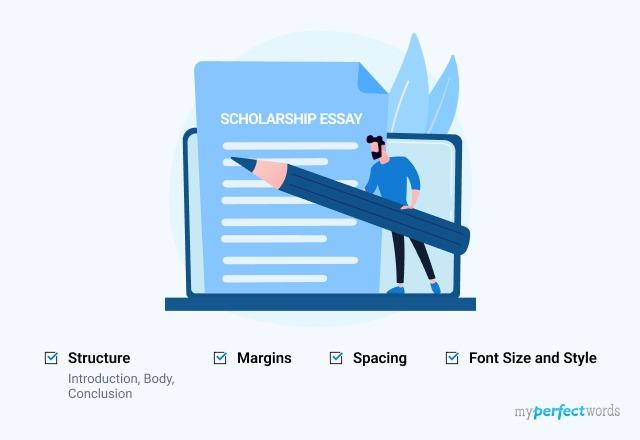
People also read
Scholarship Essay – A Complete Guide With Examples
12 Winning Scholarship Essay Examples for Aspiring Students
Practical Scholarship Essay Prompts For Students in 2023
Are you not sure what is the perfect scholarship essay format?
We know that applying for college takes a lot of effort. All applicants are required to complete a variety of documents, must pass exams, etc.
However, what is even more difficult is to apply for a scholarship and win it with flying colors! If you are applying for a scholarship, you have to write a compelling scholarship essay , and having the format right is even more critical.
Thoroughly read this blog to know how you can write a winning introduction, body, and conclusion. Also, we’ve included a list of some brilliant scholarship essay format samples.
So, without wasting a second more, let’s help you get your scholarship essay formatting right!
- 1. What is a Scholarship Essay Format?
- 2. How To Format A Winning Scholarship Essay?
- 3. The Optimal Scholarship Essay Structure
- 4. Scholarship Essay Format Examples
- 5. Scholarship Essay Format Tips
What is a Scholarship Essay Format?
A scholarship essay format is a set of rules and guidelines that you need to follow to organize your accurately.
Formatting plays an important role in scholarship essays and other types of essays and academic papers.
If you get the formatting right, it will show the committee members that you can understand and follow the required instructions.
A well-formatted scholarship essay can help you stand out. It will give the committee a sense of who you are, your career goals, and what makes you deserve financial aid.
Keep in mind that the scholarship essay is about yourself and not about someone else. So it’s essential to take a different approach to writing a scholarship essay, so you can present your views in an organized manner.
Now, let's see how you should format your scholarship essay!
How To Format A Winning Scholarship Essay?
If you’re not sure what format should you follow for a scholarship essay, don’t worry, we have got your back!
Well, most scholarship applications have the same guidelines for the scholarship application essay format. However, if you are working on an application that does not specify the format for your essay, the following format is good to follow.
Essential Scholarship Essay Format Guidelines
Here are the guidelines that you need to follow for formatting your scholarship essay.
- Double-space your text or use 1.5-spacing.
- Times New Roman, Arial, or Verdana font is appropriate to use
- If not specified, a font size between 10 and 12 points should be used
- 1-inch margin on all sides of the paper
- Insert a blank line in each body paragraph or indent every paragraph
- Include your last name and page number on the left side of the paper
- Titles are optional, but they might be provided to you by the committee
Don’t forget to follow the instructed word count by the scholarship committee. Scholarship committee members don’t read essays longer than ¾ of a page in length.
How Long Should a Scholarship Essay Be?
The ideal word count for a winning scholarship essay varies depending on the specific scholarship program's guidelines and requirements. Having said that, the usual length revolves around 500 words or fewer.
Following the word count limit is critical for a scholarship essay. Let’s say, you are asked to write a 300-word scholarship essay, then it’s appropriate to end your essay with 295 – 305 words.
Here is how you can structure your scholarship essay.
The Optimal Scholarship Essay Structure
There is no one way to structure a scholarship essay. But the most commonly used structure is the 5 paragraph format. However, the structure of the scholarship essay partially depends on the topic and your writing style.
Let’s see how to start a scholarship essay!
Always Start With a Captivating Introduction
To draw the reader’s attention, you should start with a well-written introduction. At first glance, the essay’s introduction should be able to hook the reader.
The introduction should always be related to the scholarship essay prompt . Include a strong thesis statement , and introduce the key points that you will be discussing in the body section of your essay.
Try to wrap up your introduction in a single paragraph.
Here is an example of a well-crafted scholarship essay introduction:
Use Clear and Concise Body Paragraphs
In the body of your essay, expand your main points, and back up your information with facts, statistics, quotes, and examples. Every single body paragraph should support your opinion.
To improve the readability, you should write 3 body paragraphs and keep the word limit requirements in check.
Take a look at a well-written example of a scholarship essay body:
End With An Impactful Conclusion
The conclusion paragraph holds prime importance in a scholarship essay. This part of your essay decides whether the committee forwards your application or adds it to the pile of papers!
Restate the main points from the essay in your essay conclusion . Always make use of strong and impactful words in the conclusion. Don’t forget to emphasize how the scholarship will help you fulfill your educational goals.
Here is a brilliant example of a scholarship essay conclusion:
Here is a summary of an optimal scholarship essay format:
Scholarship Essay Format Examples
For a better understanding of the scholarship essay format, take a look at some examples. The following samples will clear any doubts you might have regarding the formatting.
To get started with your scholarship essay format needs, here are some samples:
Scholarship Essay Format Template
College Scholarship Essay Format
Scholarship Essay Format for University
Scholarship Essay Format For High School
Scholarship Essay Heading
APA Format for Scholarship Essay
Scholarship Essay Letter Format
Scholarship Sample About Why I Deserve the Scholarship
Scholarship Essay Format Tips
When there is no specific guidance, it is common to struggle with certain formatting choices. Here are some expert tips for you to help you navigate the correct formatting of a scholarship essay.
- Always read the instructions carefully before you start writing
- Follow a clear and concise essay structure
- No need to include the essay question at the top as committee members know what the prompt is
- To start a new paragraph, either indent a new line or add an extra blank, but you shouldn’t do both.
- Personalize your paper as much as you can
- Always promote yourself but stick to the truth!
- You can make your essay more compelling by adding a unique story about yourself
- Keep a similar size for all paragraphs for coherency
- Be consistent with citation style (such as APA, MLA Chicago, etc.)
- Always double-check your scholarship essay for spelling or grammar mistakes
- You can ask an instructor or a counselor to assess your work
Refer to the above formatting guide every time you write a scholarship essay. Always start writing your essay as early as possible to have enough time to review your essay.
Hopefully, you will write a perfect scholarship essay with the help of the above scholarship essay guidelines and tips.
To wrap it up , scholarships are a great opportunity for students to receive money for studies and forget their financial issues. However, thousands of students apply for these scholarships, and only a few students get aid.
But, you can hire a reputable scholarship essay writing service such as MyPerfectWords.com to maximize your chances!
Our expert writers will make sure you submit a high-quality scholarship essay written and formatted according to the required guidelines.
So, if you need someone to “ write my essay for me online ” MyPerfectWords.com is your solution!
Frequently Asked Questions
Should my scholarship essay be single-spaced or double-spaced.
Follow the scholarship provider's instructions. If none are given, use double-spacing for clarity. Adjust to single spacing if necessary to meet word/page limits.
How do you write a 500 word scholarship essay?
Here are four steps to write a 500-Word essay.
- Create a Thesis.
- Write the Introduction
- Write the Body Paragraphs
- Wrap It Up with a Conclusion
Are page numbers mandatory for scholarship essays?
Follow the scholarship's guidelines, as requirements vary. Comply with their instructions to ensure your essay aligns with their criteria.
What citation style should I use in my scholarship essay if I need to reference sources?
When referencing sources in a scholarship essay, follow the citation style specified in the guidelines. If not specified, use APA, MLA, or Chicago style consistently.
Can I reuse one scholarship essay for multiple applications?
You can reuse elements of your essay, but it's crucial to tailor each essay to the specific scholarship's requirements and criteria.
Is it acceptable to use a formal tone in a scholarship essay?
Yes, a formal tone is typically preferred in scholarship essays to convey professionalism and seriousness.

Write Essay Within 60 Seconds!

Cathy has been been working as an author on our platform for over five years now. She has a Masters degree in mass communication and is well-versed in the art of writing. Cathy is a professional who takes her work seriously and is widely appreciated by clients for her excellent writing skills.

Paper Due? Why Suffer? That’s our Job!
Keep reading
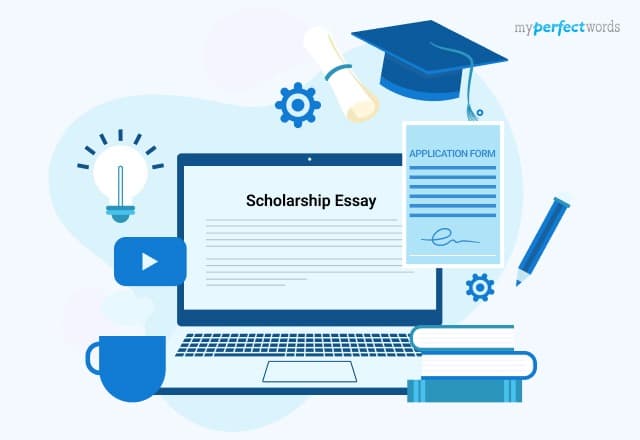
- Grades 6-12
- School Leaders
FREE Poetry Worksheet Bundle! Perfect for National Poetry Month.
10 Winning Scholarship Essay Examples From Real Students
Make your application shine.

Writing a scholarship essay can be intimidating. The competition is fierce and the stakes are high, so students are bound to feel the pressure. It may be helpful, therefore, to look at essays that were successful. What did those students do to impress the committee? These scholarship essay examples will give you a better idea of how to make an application shine!
Tips for Writing a Scholarship Essay
We’ve put together a whole guide for how to write a scholarship essay , so if you haven’t read it already, definitely give it a look! In addition, here are some quick tips to help students get started.
Carefully read the rules
The last thing you need is to be disqualified from winning a scholarship because you didn’t do the right thing.
Start early
Don’t wait until the last minute to start researching and applying for scholarships. Give yourself plenty of time to work through the process.
Get to know the provider
Think of the scholarship provider as your target audience. You want to tailor your essay to impress them, so do your research. What kinds of candidates are they looking for? What causes do they support? Dig deep for the information you need!
Think about who you are, what you want to say, and how to appeal to the scholarship committee. Write everything down and then choose the best ideas.
The scholarship committee will be reviewing many applications. How can you make yours unforgettable? Highlight your strongest assets, share hard lessons if they showcase your growth as a person and/or student, and be honest. Never lie in a scholarship essay!
Be professional
Consider this the most important academic paper you’ve ever written. Don’t use slang or casual language. Submit a properly formatted essay that’s been well-edited and proofread by multiple people.
One last tip
Don’t reuse scholarship essays! Yes, it’s time-consuming, but students need to put the same effort into every application. Use the same process and it will get faster and easier every time!
Scholarship Essay Examples
Afc visionary scholarship essay by nicole kuznetsov.
Award Amount: $5,000
Essay prompt: Why do you want to go to college? Why is it important to you?
Why it was successful: The beauty of this essay is that it’s well-organized and simple. Nicole Kuznetsov chose to outline her story by using chronology and provided a clean, concise story following a linear path.
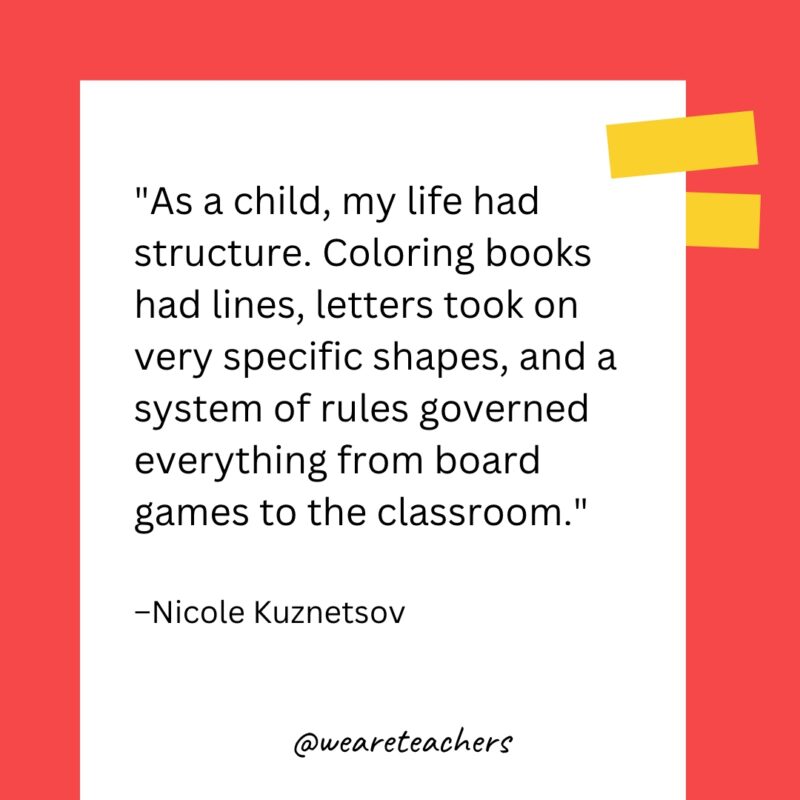
North Coast Section Foundation Scholarship Essay by Christine Fung
Award Amount: $1,000
Why it was successful: Christine Fung masterfully shared how her upbringing instilled strong values, a love for education, and a passion for medicine .
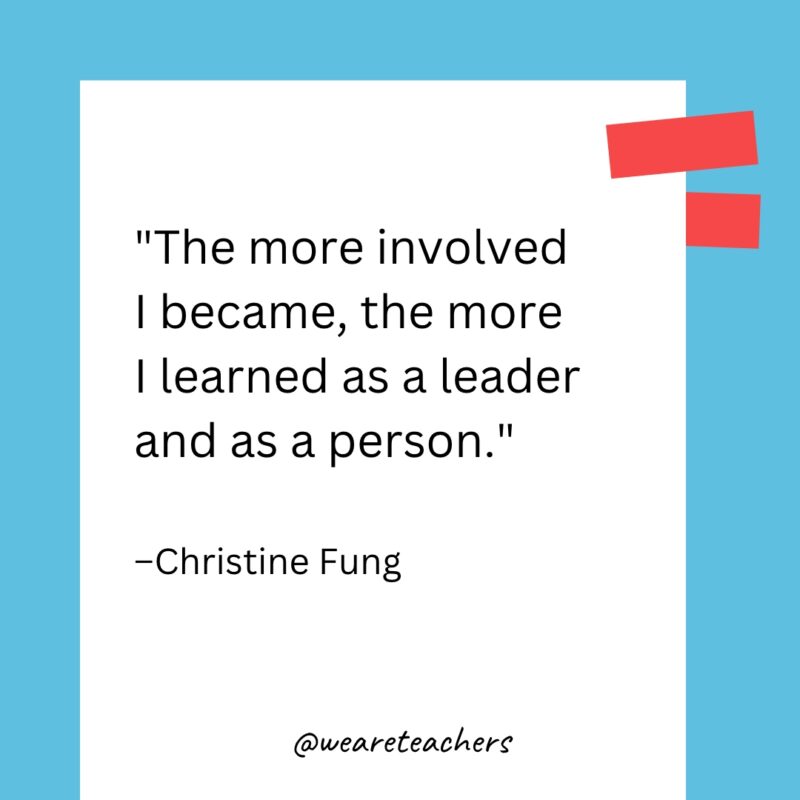
The Bill Browning Scholarship Essay by Gabby DeMott
Award Amount: $10,000
Essay prompt: Discuss an accomplishment, event, or realization that sparked a period of personal growth and a new understanding of yourself or others.
Why it was successful: Gabby DeMott shared her experiences with personal growth and overcoming fears in Germany. She also appealed to the very human feeling of wanting to belong in a way that was inspiring.
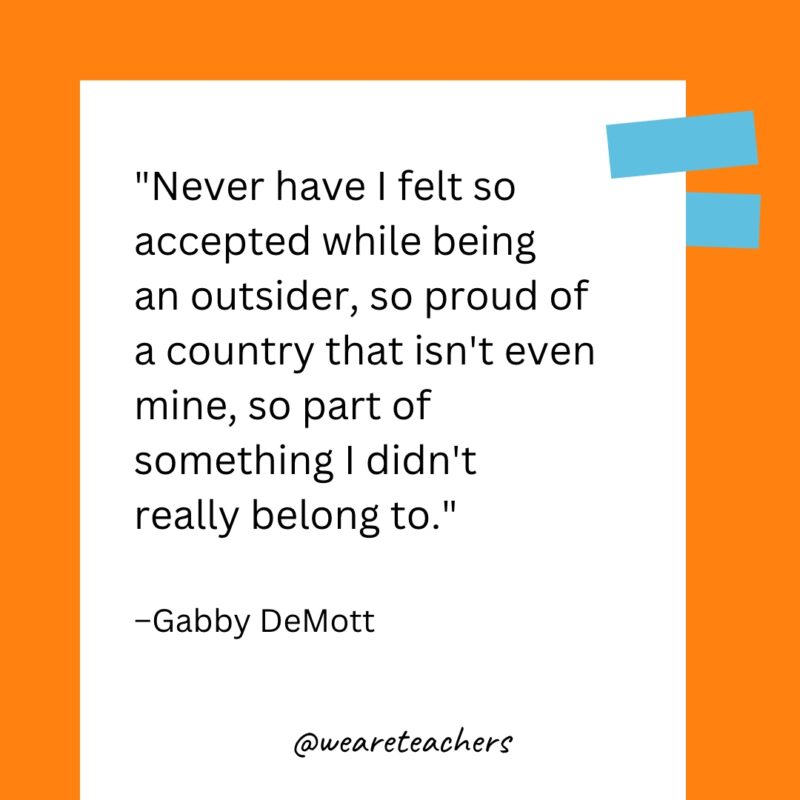
Life Happens Scholarship Essay by Emily Trader
Award Amount: $15,000
Essay prompt: How has the death of a parent or guardian impacted your life financially and emotionally? Be sure to describe how the loss of your parent/guardian impacted your college plans, and explain how the lack of adequate (or any) life insurance coverage has impacted your family’s financial situation.
Why it was successful: Emily Trader fully addressed the prompt in honest, beautiful detail. She knew her audience and tailored her essay to appeal to them while telling her compelling story.
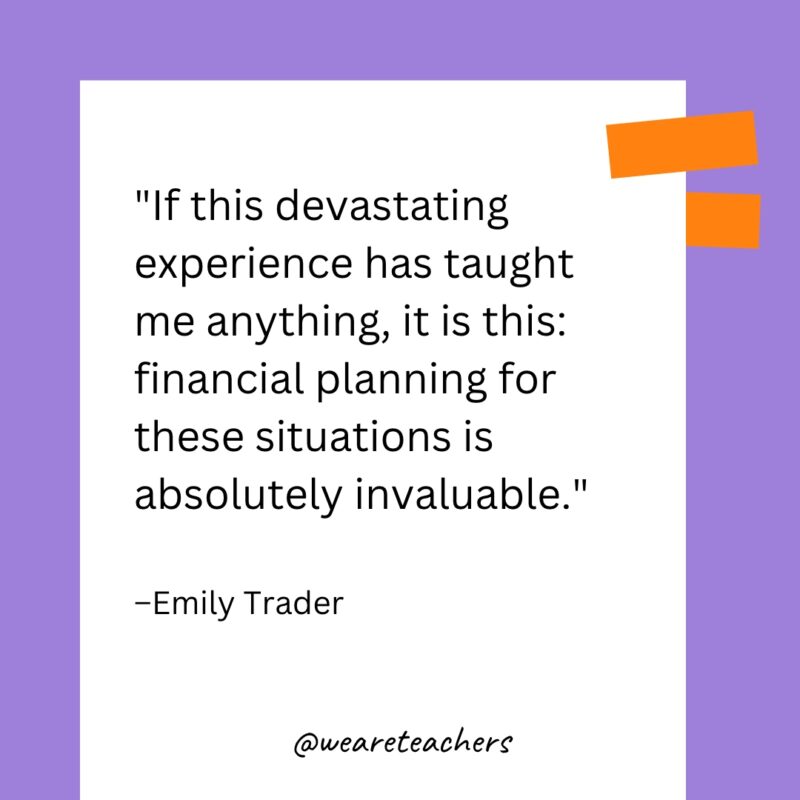
Change a Life Foundation Scholarship Essay by Isabella Mendez-Figueroa
Essay prompt: Please explain how your experience volunteering and participating in community service has shaped your perspective on humanity. Elaborate on how these experiences have influenced your future ambitions and career choice.
Why it was successful: Isabella Mendez-Figueroa shared an empowering story about her parents overcoming financial adversity so that she and her sister could be the first in their family to go to college.
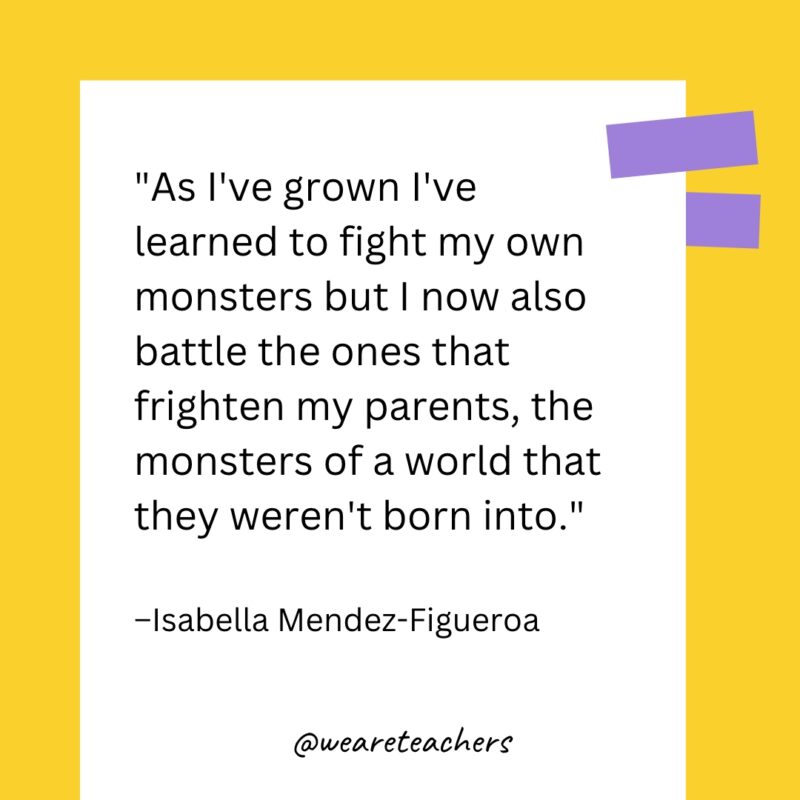
Giva Scholarship Essay by Joseph Lee
Essay prompt: Who is (or what makes) a good doctor?
Why it was successful: Joseph Lee offered a captivating , personal story that was essentially a list of things that make someone a good doctor without it feeling boring or calculated.
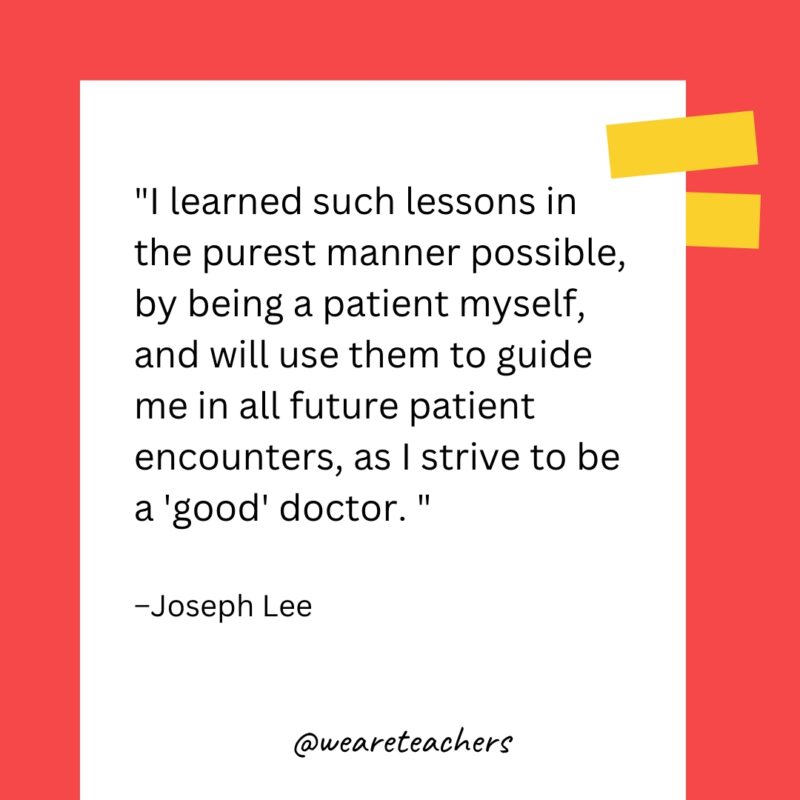
New York University College of Arts and Science Scholarship by Ana
Award amount: $39,500
Essay prompt: Explain something that made a big impact in your life.
Why it was successful: Ana discussed how early experiences w ith learning difficult things has contributed to her passion for teaching and supporting students.

The Fund for Education Abroad Rainbow Scholarship Essay by Steven Fisher
Award amount: $7,500
Essay prompt: The Fund for Education Abroad is committed to diversifying education abroad by providing funding to students who are typically under-represented in study abroad. Please describe how you and/or your plans for study abroad could be viewed as under-represented.
Why it was successful: Steven Fisher’s powerful essay connected his realizations about his own sexual identity with embracing the beautiful diversity found all around the world.
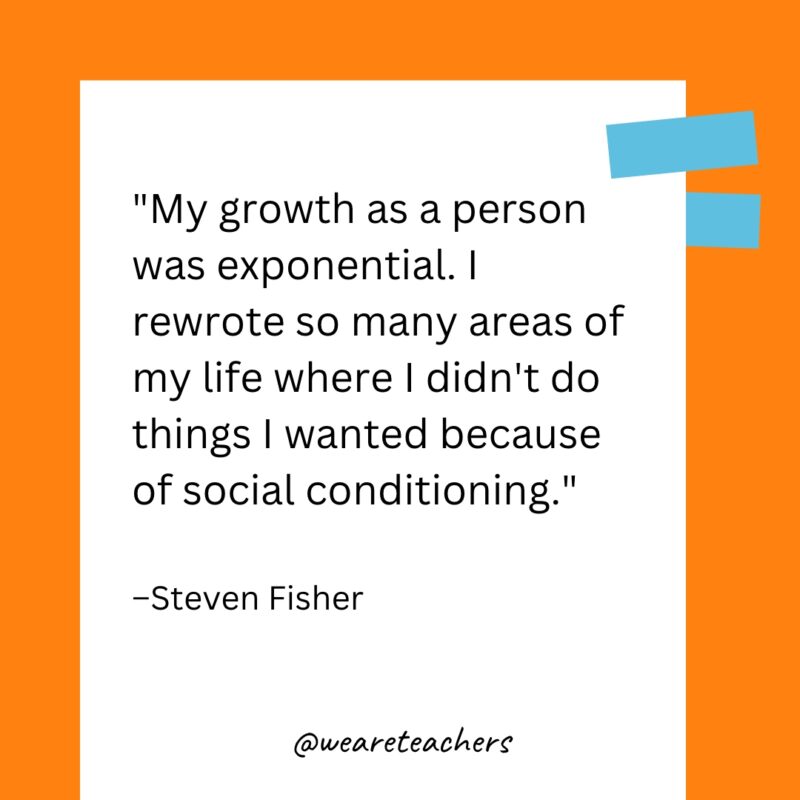
Women’s World Banking Founder’s Scholarship Essay by Rosaisha Ozoria
Essay prompt: Write about your hopes for the future of women and girls worldwide.
Why it was successful: Rosaisha Ozoria focused on a very specific topic , financial literacy for Hispanic women, and emphasized its importance and relevance to her own life.
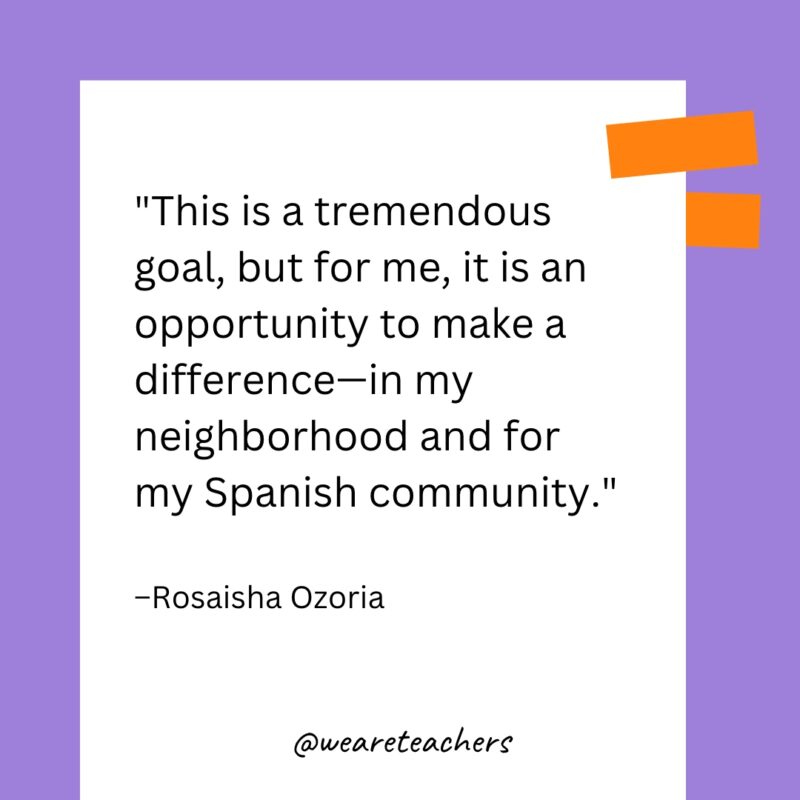
The Millennium Gates Last Dollar Scholarship Essay by Famyrah Lafortune
Award amount: $3,500
Essay prompt: Education is the most powerful weapon which you can use to change the world.” —Nelson Mandela Describe a change you would like to make in the world. Tell us about how you would plan to make that change, and what obstacles you might encounter along the way.
Why it was successful: Famyrah Lafortune starts with a strong statement about ending racial inequality and then details the steps she’ll take to make it happen.
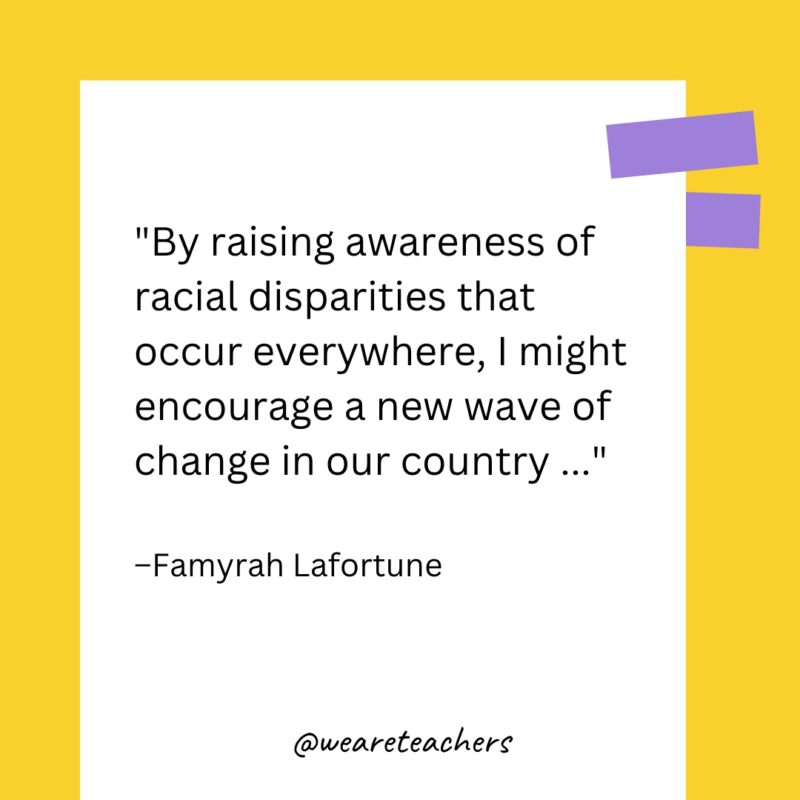
Do you have any great scholarship essay examples? Share them below!
Plus, check out the ultimate guide to college scholarships, want more suggestions be sure to subscribe to our newsletters ..
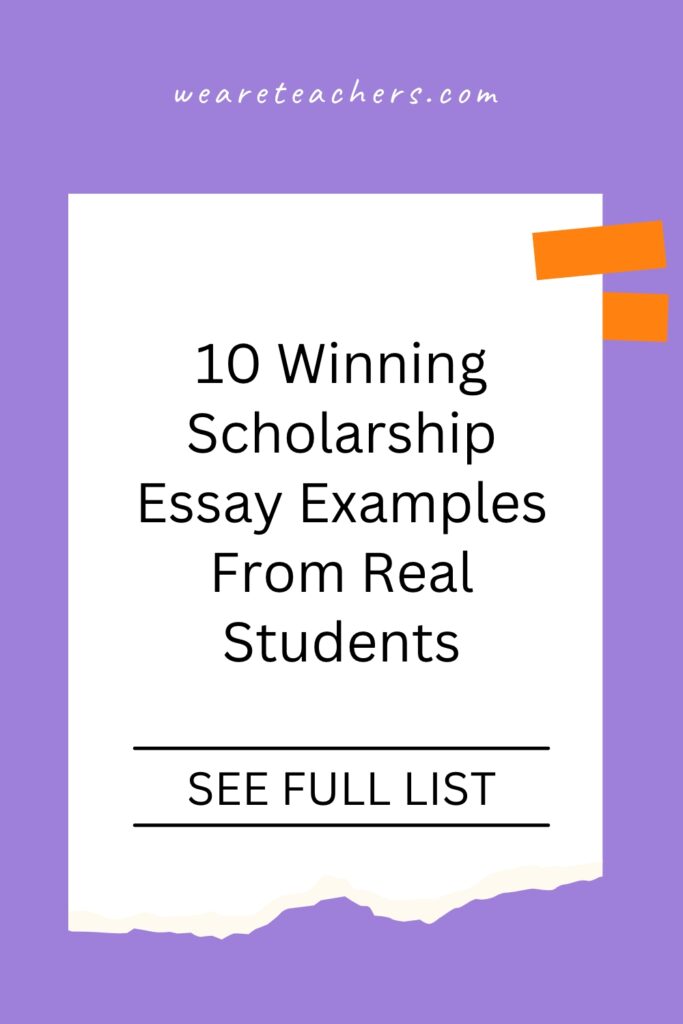
You Might Also Like
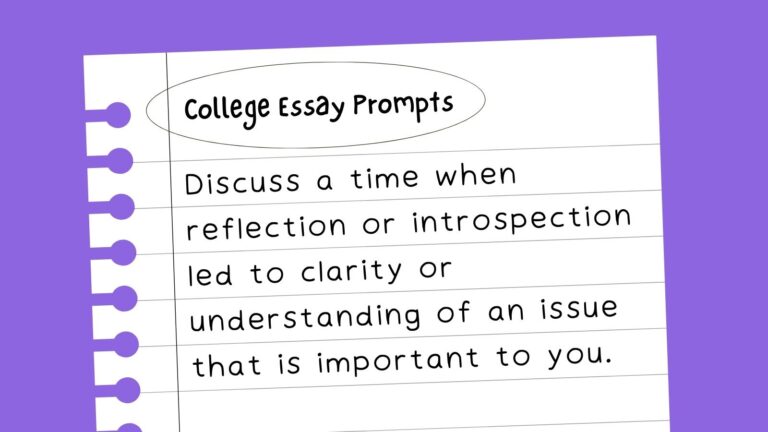
60+ College Essay Prompts From Actual 2023-2024 Applications
Ideas to inspire every college applicant. Continue Reading
Copyright © 2023. All rights reserved. 5335 Gate Parkway, Jacksonville, FL 32256
What’s the right scholarship essay format and structure?
Many scholarships require you to submit at least one essay–and maybe you’ve already got that covered . But now you’re wondering: how should your essay be formatted? Should it be double-spaced or single-spaced? Should you include a title? Should you include the prompt? What does a typical scholarship essay format look like?
Although you don’t have to worry about essay formatting at Going Merry ( we’ll structure and submit your application for you , with our pre-filled forms!), maybe you’re also applying to some other scholarships too. So we’re here to help you understand how to format your scholarship essay.
Where do I start?
Does a scholarship essay need a title , how should a scholarship essay be formatted what font should i use , how should a scholarship essay be structured can i get a template or outline, scholarship essay format at a glance, should scholarship essays be double-spaced , start writing.

You’ll need to dive into a personal experience or tell your story of an accomplishment, a hobby, an interest to the scholarship provider, showing them your experience with a structured and descriptive essay. Create an outline of your essay (this can be old school, with pen and paper!), write it out, and then ensure you’re formatting it professionally and properly. (Need more scholarship essay tips? Try these.)
This depends on the essay submission format.
If there is a text box entry, you can just copy and paste the body of your essay, without a title. This is the case, for example, when applying for scholarships through Going Merry .
If you’re attaching an essay as a Word or PDF document, you can optionally include a title, but this is usually unnecessary unless there are special scholarship essay format instructions to do so. (One popular reason you might need to do this is if the prompt is to write about any topic of your choice, or to choose your own prompt. In this case, to give the reader more context before you begin your essay, a title may be helpful.)
If you are required to create a title, we recommend doing one of two things:
- Think of a title early on. Write down that title, write your essay, and then circle back to the title to tweak it as needed. -OR-
- Write your essay and then come up with a title . Your creativity might be fresher once you’ve answered the prompt and included the meat and potatoes of the scholarship essay, which might help you come up with a suitable title at the end.
Also, don’t stress! While a clever title can improve your essay, it’s hardly a make-or-break. A very descriptive title that summarizes the prompt would work fine, as long as your essay is strong.
Relatedly, you don’t need to include the essay question or prompt at the top of your essay. The scholarship committee will know what the topic or prompt is!
(Want inspiration from winners? Check out these winning scholarship essays .)

If you’re writing your essay in a document to upload to your Going Merry profile , or to submit to a scholarship application on a provider’s website , and the scholarship provider doesn’t have explicit guidelines, it’s best to just follow a standard professional style and format. That means using 1-inch page margins, 12-point font size double-spaced (or 1.5 spaced), and a “standard” font like Times New Roman in classic (default) black. Don’t get creative with fonts or colors here. You want the content of your essay to be what stands out, rather than your unorthodox formatting.
There is no one-size-fits-all answer to how to best structure a good scholarship essay. In fact, you can see how wide-ranging these winning essays are. In fact, how to best answer and structure your essay depends partially on the essay and partially on your personal writing style.
However, one pretty common way of structuring your scholarship essay is how Going Merry winner John Flowers Jr did it . Here’s the template/outline:
- Introduction (1-2 paragraphs) : Draw the audience in with an attention-grabbing opening sentence related to the prompt. Introduce your main points that you’ll be sharing later in your essay.
- Example of an opening sentence from a Going Merry scholarship winner: “My parents were never given a shot at having an education beyond high school.” This tells us about the student’s parents and how it might have influenced the student’s decision to apply to college, setting the tone for the essay.
- Introductory paragraph: “My parents were never given a shot at having an education beyond high school. They were never given a shot to show their full potential and make a difference in the world. They had to start life at an early age. I want to succeed in college for them and for me. I want them to be proud of me for doing a task that they weren’t able to do.” – This expresses John’s understanding of what his parents had to do, and that they did not get a chance to attend college. John also expresses his determination, and his drive to attend college to do something for his parents.
- Body (1-3 paragraphs) – Expand on your main points. Back up your information with evidence, examples, and facts. This is where you’re encouraged to share details of how you got to where you are today, what inspired your hobbies, interests, or drive to attend college, and how the scholarship will help you achieve your academic and/or personal goals. Remember to use specifics rather than make general statements!
- Conclusion (1 paragraph): Explain how winning this scholarship would help support your goals (and maybe also have wider community impact)
- An excerpt from John’s conclusion: “Winning this scholarship will make a difference to me because it will allow me to cover college financial issues that may hold me back from reaching my career. Being less stressed about worrying about college fees will allow me to focus more of my attention in class to earn the credits, and not worry about how I’m going to pay for the class.” – John explains how valuable this scholarship is for him, not just monetarily, but also how it will help him achieve his goals.

- Read the scholarship essay format guidelines carefully, to check if the scholarship includes instructions
- If you’re submitting your scholarship essay outside of the Going Merry platform, set up your document with a 1-inch margin
- Aim for a 12-point font
- The best font to use is Times New Roman. Other good options include Arial, Calibri, Tahoma, and Verdana
- Always get a second opinion on the scholarship essay format for grammar, punctuation, spelling, structure, etc.
- Online form
- Going Merry scholarship platform (apply to thousands of scholarships and upload your scholarship essay)
You’re probably used to double-spacing your high school papers and essays. Since adding line spacing can make essays more readable, using 1.5-spacing or double-spacing is a good idea if you’re attaching an essay as a Word doc or PDF. But again, unless the scholarship provider has specified this information, it’s not mandatory.
More important is to not leave your essay as one block of text. Instead, we recommend separating paragraphs when you’re starting a new thought or idea.
For scholarship essays on Going Merry, you won’t have to worry about formatting because we will do this for you whenever you submit applications through our platform.
We know you’re going to rock your essay with these scholarship essay format guidelines, so get to it! It’s best to start writing your essay as early as possible to give yourself time to review the essay, ask someone (like a parent, guidance counselor, or friend) to proofread your essay, and then make sure to submit it on time. (On Going Merry , we’ll send you deadline reminders on your favorited scholarships and draft applications, so you won’t miss them!)
When you’re ready to apply for scholarships, sign up for Going Merry ! You’ll create a free student profile, enter your information once, and then we’ll match you with thousands of scholarships that you can apply to with just the click of a button. Don’t worry about entering your information twice – we’ll pre-fill this for you!
If you need additional resources to accompany this scholarship essay format guide, check out these related blog posts for more writing tips:
- How to answer “Why do you deserve this scholarship?”
- How to Write the Best Personal Statement
- 10 Tips for Writing An Essay About Yourself
- How to Write a Career Goals Essay
- 6 Tips for Writing Scholarship Essays About Academic Goals
- College Essay Guy: How to write a scholarship essay
- Recent Posts
- Scholarships for Students in Pennsylvania for 2021 - November 11, 2020
- Counselor Starter Guide: How to Use Going Merry’s Scholarship Platform - September 9, 2020
- How to write a financial need statement for your scholarship application (with examples!) - August 13, 2020
Ready to find scholarships that are a match for you?
How to Find and Apply for Scholarships
College board scholarship search, what are scholarships .
Scholarships are a type of financial aid commonly referred to as “free money” or “gift aid.” Scholarships usually require an application and are often awarded to students based on a combination of factors including merit. Merit scholarships tend to have specific requirements and are awarded to applicants based on certain skills and accomplishments and may not be based on financial need. Scholarships may be renewable, meaning you can receive scholarships for more than one year. A new application may be required along with maintaining certain eligibility requirements, such as GPA or a certain major.
Why do I need scholarships?
Scholarships are a great type of financial aid because they do not have to be repaid. Receiving scholarships can help cover the remaining bill and indirect costs, while also minimizing the amount you need to borrow in loans while in college.
What are some common scholarship application requirements?
Many scholarships require similar application materials, which commonly include:
- The application, which can be paper or an online form.
- Essays, often personal statements, that provide insight into your activities inside and outside the classroom.
- Letters of recommendation from teachers, coaches, guidance counselors, community members, or other mentors.
- Honors or awards you have received, academic or otherwise.
- Information about your high school or college, which may include your transcript, GPA, Student Aid Report, or financial aid offer.
- A résumé that includes any employment, volunteer, or extracurricular experiences.
Specialized scholarships may require additional information and may have a priority deadline. For example, scholarships supporting the arts may require portfolios or writing samples. Be sure to read each application thoroughly for requirements so you don’t miss any.
What should I do before college to increase my chances?
Since many scholarships are merit based, maintaining good grades and increasing your involvement in school and community activities are important. Some scholarships have GPA requirements, so keeping your grades up will help open more opportunities. Additionally, many applicants with varied extracurriculars and volunteer or job experiences may stand out. The more scholarships you’re eligible for and apply for, the better the odds you have of receiving one.
What are the best ways to find and receive a scholarship?
There is no guarantee that you’ll receive a scholarship, but there are a few things you can do to increase your chances while applying. One of the most important things to remember is that the scholarship committee wants to get to know you through the applications—you want to show why your college education is worth investing in.
There are a few things that you can do to increase your chances, including:
- Start early and search year-round: No matter what stage in the college process you’re at, you should start looking for scholarships now. There are even scholarships that high school students can receive before senior year. Scholarship deadlines vary, so setting some time aside every few weeks to search and apply will open up more opportunities of securing a scholarship.
- Use the right search engine: Finding scholarships to apply for can be difficult, but with the right search engine you can narrow your search and find scholarships you’re eligible for. BigFuture’s scholarship search is a great resource to use.
- Find a balance: You should apply for several scholarships—the more you apply for, the better your chances of receiving one. However, it’s important to use your time wisely. You should only apply for those you’re eligible for, based on the requirements.
- Research local scholarships: Local scholarships tend to have fewer applicants, meaning you may be more likely to get them. Your high school counselor or college financial aid department might have insight about where to find and apply for local scholarships. Be sure to talk to others in your community, and check with local businesses and organizations like banks and churches.
How do I know a scholarship is legit?
While plenty of legitimate scholarships are available, some fake scholarships are set up to scam students out of money or personal information. Using reliable search engines, like BigFuture, can help avoid this. Scholarships should always be free to apply. Some may ask for your bank account information after choosing you as a recipient, but they should not ask for this information as an application requirement. If you’re unsure, contact the organization or company providing the scholarship to ensure they are legit.
Finding and applying to scholarships sounds like a lot of work—how can I make this process easier?
Because scholarships don’t need to be repaid, they can be an important part of making college affordable. However, we know that it might not always be feasible to spend a lot of time applying. There are a few things you can do to simplify the process and save time where possible.
- Start early: Prioritize getting two or three letters of recommendation, and write your essay/personal statement before you start searching to help save time.
- Time management: Plan to spend a day or two a month searching and submitting applications with your prepared materials to avoid last-minute applications, missed deadlines, and stress.
- Stay organized: Collecting and organizing your application materials and tracking due dates will help you stay on track and avoid missing out on opportunities.
- Reuse essays when possible: Many scholarship essay topics are similar, so editing one of your previously written essays to fit the scholarship you’re applying for can save you time.
With these tips and resources, you’ll be better prepared for scholarship applications and increase your chances of receiving scholarships to help cover your college costs. Check out your chance to earn $500 and $40,000 scholarships in monthly drawings offered by BigFuture to students who complete the steps to plan for college .
Related Articles

IMAGES
VIDEO
COMMENTS
Action- Leave the essay open-ended so that the reader thinks about you. For example, "I put on my jacket and stepped outside confidently.". End the conclusion with a description: "The sun began to peak out from the clouds, sending rays of orange and red throughout the sky, warming my face and brightening up the world.".
This guide will show you how to end a scholarship essay in five steps, allowing you to close in the most effective and succinct way! 1. Recall your introduction. You can view your conclusion as a companion to your introduction. While an introduction provides a quick survey of the main points you'll go over in your body paragraphs, a ...
Yes, but make sure your essay directly addresses the prompt, respects the word count, and demonstrates the organization's values. If you plan ahead, you can save time by writing one scholarship essay for multiple prompts with similar questions. In a scholarship tracker spreadsheet, you can group or color-code overlapping essay prompts; then, write a single essay for multiple scholarships.
2. Tie conclusion back to your introduction. If you gave a powerful personal story in your introduction, the conclusion is a great time to bring the reader back to that. For example, if you opened your scholarship essay talking about a specific personal story, the conclusion is a great time to tie back to that story and give it a great ending.
The first sentence of the essay is what makes the reader want to continue reading. Engage the reader by appealing to the senses. Create a sense of wonder in your essay, making the reader want to learn more about you. Keep the ending of the essay in mind as you craft the beginning.
Structuring Your Essay. Your essay should follow a standard format that includes a clear beginning, middle, and end. Typically, you should: · Establish your main idea in the introduction. · Include a separate body paragraph for each key point that supports your main idea. · Draw it all together and revisit your main idea in the conclusion.
Option 4: End on an action. Ending on an action can be a strong way to wrap up your essay. That might mean including a literal action, dialogue, or continuation of the story. These endings leave the reader wanting more rather than wishing the essay had ended sooner. They're interesting and can help you avoid boring your reader.
Approach #1: Use the resources above to write a great essay that spells out your big dreams, then end with 1-3 sentences describing specifically how you'll use the scholarship money. (We'll call this the "I have big dreams and you can help" approach.) Approach #2: Explain your financial situation in detail, then end with 1-3 sentences ...
Furthermore, most scholarship essay prompts more or less resemble standard supplemental essay questions. The trick then is to make your scholarship essay stand out. The following article and scholarship essay example will offer up pointers for anyone striving to win a college scholarship. Organizing Scholarship Essays by Prompt
A great scholarship essay helps the scholarship provider understand the real person behind the application and can be the key to winning the award (assuming you meet the other scholarship criteria). Scholarship Essays vs. College Essays. Scholarship essays are very similar to your college application essays in terms of strategy. Many ...
Step 1: Return to your thesis. To begin your conclusion, signal that the essay is coming to an end by returning to your overall argument. Don't just repeat your thesis statement —instead, try to rephrase your argument in a way that shows how it has been developed since the introduction. Example: Returning to the thesis.
2. Avoid cliches: When ending an essay for a scholarship, it may be tempting to use cliches such as "in conclusion" or "to sum up." These phrases are overused and can make your essay sound ...
Consider how your interests and experiences align with what the organization is looking for, and make them clear throughout your essay. 2. Show your personality. You should also use your voice in your essay. Give the scholarship committee insight into who you are as a person — what drives you, what motivates you, and what interests you.
Now you've written your scholarship essay—or most of it. All that remains is the hardest part: the conclusion. You know that the conclusion can make or break any essay, and this isn't an essay that you want broken. To give yourself the best possible shot at a scholarship, make sure that the conclusion of your essay is the best part of it.
In conclusion, this scholarship essay about nursing encapsulates my unwavering passion, dedication to patient care, commitment to advocating for health equity, and pursuit of excellence. By sharing my journey, aspirations, and the alignment between my goals and the scholarship's mission, I hope to convey my worthiness as a scholarship recipient
Scholarship Essay Example #5. Questbridge Finalist essay earning $3,000 in application waivers plus $3000 in local scholarships by Jordan Sanchez. Prompt: Some students have a background, identity, interest, or talent that is so meaningful they believe their application would be incomplete without it.
Why This Scholarship Essay Example Worked: 4. Going Merry Scholarship Success Story by Jesus Adrian Arroyo-Ramirez. Why This Scholarship Essay Example Worked: 5. Why College Is Important to Me by Nicole Kuznetsov. Why This Scholarship Essay Example Worked: 6. Financial Literacy for Hispanic Women by Rosaisha Ozoria.
Sample scholarship essay #1. By Grace G. ESSAY PROMPT: Submit an essay of 350-500 words to tell us ONE thing you are, or were, most concerned about regarding preparing for college, and what you've done, or are doing, to overcome the challenge.
Essential Scholarship Essay Format Guidelines. Here are the guidelines that you need to follow for formatting your scholarship essay. Double-space your text or use 1.5-spacing. Times New Roman, Arial, or Verdana font is appropriate to use. If not specified, a font size between 10 and 12 points should be used.
Student Resources. Scholarship Essay. Writing a scholarship essay can feel overwhelming and daunting, but unlike other academic genres, it can be a chance to use your own voice and be rewarded for it. Scholarship essays are a great opportunity to show who you are and tell your story to make a lasting impression on your audience.
The Bill Browning Scholarship Essay by Gabby DeMott. Award Amount: $10,000. Essay prompt: Discuss an accomplishment, event, or realization that sparked a period of personal growth and a new understanding of yourself or others. Why it was successful: Gabby DeMott shared her experiences with personal growth and overcoming fears in Germany.
Scholarship essay format at a glance. Read the scholarship essay format guidelines carefully, to check if the scholarship includes instructions. If you're submitting your scholarship essay outside of the Going Merry platform, set up your document with a 1-inch margin. Aim for a 12-point font. The best font to use is Times New Roman.
Reuse essays when possible: Many scholarship essay topics are similar, so editing one of your previously written essays to fit the scholarship you're applying for can save you time. With these tips and resources, you'll be better prepared for scholarship applications and increase your chances of receiving scholarships to help cover your ...
Deadline: Essays must be submitted by July 1, 2024. ... Essay Awards: Scholarship funds will be directly awarded to the grand prize winner and runners-up shortly after the decision. This essay writing contest offers a platform for students to showcase their ability to engage critically with relevant issues, contributing their voice to the ...
681 likes, 0 comments - ismailnbotchwayApril 8, 2024 on : "Success Academic Coaching helps students with college essays, scholarships, resumes and more for only $150. 1 on 1 support and advice!